Altruism and Residence Permits - How to Volunteer in Croatia
October the 12th, 2022 - Volunteering is always an excellent way of showcasing altruism and selflessness. On the more practical side, it’s often a way into a paid position or simply to beef up the level of experience you have in a particular industry or field on your CV. To volunteer in Croatia, you'll need to get acquainted with some paperwork, nationality depending, of course.
When it comes to volunteering abroad, you tend to get back just as much as you give in the form of a wealth of new experiences, the taking in of another culture or language, and an array of things volunteering in your home country couldn’t give you.
Did you know that if you volunteer in Croatia, it's also a way you can legitimately gain residence if you plan to stay for longer than ninety days?
The rules surrounding becoming a volunteer in Croatia are handled by the Law on Volunteering (Zakon o volonterstvu) and there are two ways in which you can volunteer in this country - short and long-term. Welcome to the world of the udruga (non-profit association/organisation).
How can I find out about volunteering opportunities?
A fantastic resource for finding volunteering opportunities all over the country, even in more obscure locations, is the Zagreb Volunteers’ Centre. This NGO provides all kinds of information for both Croatian and foreign nationals, including facilitating connections between different associations and organisations in different locations, even outside of Croatian borders but within the EEA. They can be found on social media under the name ‘Volonterski centar Zagreb’, and emailed at This email address is being protected from spambots. You need JavaScript enabled to view it..
Short-term volunteering
The first is the simplest of all - volunteering for ninety days or less within a single calendar year, with those ninety days either being in one chunk, or split up into shorter time periods. In this case, you don’t need to apply for residence or have a permit to prove you can stay in the country. While this is by far the simplest way to go about volunteering, it wouldn’t be Croatia without at least a little paperwork, would it?
Work registration certificates
Most foreign citizens who plan to volunteer need to get a work registration certificate (potvrda o prijavi rada), even if they’re not planning on staying longer than ninety days, and despite the fact that they won’t be earning a wage for carrying out said work. You’ll notice I said ‘most’ foreign citizens, and that means that anyone who has foreign citizenship, as well as individuals who hold Maltese, Austrian, British, Dutch or Slovenian passports, require a work registration certificate. All other nationals of the European Economic Area don’t require it (this includes Swiss nationals).
How do I get my hands on such a certificate?
You guessed it, the administrative police station (yet again). In this case, you don’t need to involve the administrative police station responsible for your area of stay, but rather the one responsible for the area in which the headquarters of where you’re volunteering is registered. These certificates can be obtained by either you as the volunteer, or by the udruga you’re volunteering for.
What do I need to provide?
First of all, you’ll need a document (which is an application form) called ‘an application for the issuance of a work registration certificate’ which will be provided to you by the police when you go there. You’ll need to fill it in as instructed on the form, with information including your full legal name, your date of birth, place and country of birth, and the citizenship you hold. On top of that, you’ll also need to make clear the amount of time you require the work registration certificate to be valid for, the type of volunteering you’ll be engaged in, and the exact number of days you intend to spend engaged in it.
You’ll also need to provide the following:
The tourist visa you entered the country with (if applicable to you)
A copy of your passport or government-issued ID card as well as a certified translation into Croatian from whatever language it is in, if that language isn’t English. So, to be perfectly clear there, if your passport or ID card is in English, you don’t need to get it translated.
Proof of the arrangement you’ve entered into in which you plan to volunteer. You can prove this in two ways, either through a partnership agreement or through a volunteering contract. You’ll be provided with one of the above by the organisation you’re volunteering for upon reaching your agreement with them.
You’ll then need to pay a small fee for all of the above in tax stamps. These tax stamps look like your usual postage stamps and are typically required for administrative payments made to the state. You can buy them from kiosks such as Tisak, particular shops which have the words ‘Narodne novine’ on them, banks, courts, some book stores and various other locations, including from notaries. You’re more than likely to find a Tisak kiosk nearby, wherever you are, so that should be your first port of call. You can also buy them from an institution called ‘Fina’, and you’re also likely to find one without much effort.
You will need to come back to that same administrative police station to pay another administrative fee once your work certificate is approved. You will be given a paper payment slip and be instructed on how to pay it. If you’re not immediately told how to pay it, do ask. It is very simple, but if you’re not sure, ask, ask, and ask again.
Long-term volunteering
If you intend to volunteer in Croatia for a period which exceeds ninety days, but no longer than one year in total, then you’ll need to apply for residence in Croatia in order to have a lawfully regulated stay here. In this case, despite the fact that as a volunteer you won’t be receiving a salary for volunteering, you’ll need to apply for a work and residence permit (dozvola za boravak i rad). First I’ll go into what you need to provide when you apply, and then explain a few caveats.
What do I need to provide?
You’ll need to provide a filled in application form for temporary residence (privremeni boravak), which will be provided to you by the administrative police station when you go there to make your application. The form is called ‘1B’ and they are slightly different depending on whether you hold EEA citizenship or not.
A copy of your passport or government-issued ID card and a new photo of yourself (30x35 millimetres).
Your registered address in Croatia. You’ll need another form for that, and there is once again a form for EEA citizens and a form for those who come from third countries, both of which can be asked for at the police station. You’ll be given back an officially stamped copy of this same address registration form. Don’t lose or misplace this because you’ll need it, precisely for this part of the long-term volunteering application, for example!
Proof of you having valid health insurance (this can be travel insurance, foreign health insurance or an EHIC from your home country. You can also of course use the card proving you’re insured in Croatia by HZZO if you’re already insured here).
In many (but not all) cases, you’ll be asked to provide a criminal background check from your home country.
Proof that you have enough money to take care of yourself throughout your intended period of stay in Croatia. You will likely also be asked to show proof of any costs the organisation you’re planning to volunteer for will cover, be that accommodation, food, and anything in between.
Proof that the organisation you intend to volunteer for is registered and headquartered in the Republic of Croatia and that said organisation has a third party liability insurance policy. This requirement doesn’t need to be fulfilled if it is part of the European Solidarity Force.
On top of all that, you’ll also need…
Proof of your agreement with the organisation you intend to volunteer for which includes the period of time you intend to carry out volunteer work for them, a description of the programme, the number of hours you’ll spend volunteering, and the list could be longer depending on your individual situation and the type of volunteer work you’ll be doing.
A volunteer’s contract
This document needs to include many things, so I’ll start with what it needs to say about you as the would-be volunteer. You’ll need to provide the following:
Your full name, your ID card number, your address and your OIB.
The full title, address and OIB of the organisation or association you’ll be volunteering for.
The period of time and location at which you’ll be volunteering.
What exactly you’ll be doing.
Your signature.
The organisation you’re going to be volunteering for needs to provide the following:
The organisation’s obligations towards you as the volunteer, as well as your rights and obligations to them.
The level of safety you as the volunteer will be guaranteed during your time spent with the organisation.
Proof that your rights as the volunteer will be respected and how that will be ensured.
A statement that you won’t be paid for your work, but with details of things that will be covered (such as the cost of food, accommodation or travel) or reimbursements that the organisation will pay for you as the volunteer.
Clauses from the Croatian Law on Civil Obligations and the Law on Volunteering.
The conditions and procedure of and for the termination of the volunteering contract.
The signature of the association or organisation (udruga).
Things to note
A stay and work permit issued to a person in order for them to engage in long-term volunteer work doesn’t allow them to work for a Croatian company in exchange for money.
Once your long-term volunteering is approved, you can volunteer for that same organisation anywhere in the country, if said organisation has multiple outposts, but bear in mind that you’ll need to make another application for a different residence card for each new contracted time period.
There are third country nationals who have attempted to gain temporary residence in this way, thinking that it might be an easy route if they have no other ways at their disposal, but have found it to be quite cumbersome of a task. This isn’t an issue for EEA citizens, because they’re entitled to residence based solely on the citizenships they hold, but for those who don’t have an automatic right to stay in the country for longer than ninety days, just be aware that the volunteering idea isn’t as straightforward as you might think it will be. Even altruism comes with application forms and formal processes.
Volunteering is not a path to permanent residence because the time spent in Croatia on stay and work permits for this purpose isn’t calculated into ‘time spent in Croatia’ to rack up to the five years you need in order to apply for that status. If it’s permanent residence you want, don’t opt for this route.
Make sure to check out our dedicated lifestyle section for more.
Volunteers Plant 15,000 Seedlings Across Croatia Within Forestation Campaign
ZAGREB, 12 Dec 2021 - Thousands of volunteers have planted roughly 15,000 seedlings throughout Croatia in the last 30 days within the CO2MPENSATING BY PLANTING forestation campaign, the Scout and Guide Association of Croatia reported last Tuesday.
The project, organized by this association in cooperation with the state-run Hrvatske Šume forest management company and the Heart agency, intends to help reforest the areas in Croatia already affected by climate change.
The project would like to engage companies, institutions, and all other interested parties that want to compensate for their CO2 emission and neutralize their carbon footprint, becoming a positive example of care for the environment and the community.
The program Šumoborci (Forest Fighters) is an educational part of the campaign CO2MPENSATING By PLANTING, and all participants, in addition to taking part in interesting workshops, will be able to plant their seedlings through forestation campaigns and thus offset part of their CO2 emission from their carbon footprint.
The project is being implemented under the auspices of the US Embassy in Croatia, the Office of the European Parliament in Croatia, and the Ministry of Economy and Sustainable Development.
To read more about lifestyle in Croatia, follow TCN's dedicated page.
Saturday Volunteering with Beer: Active Weekends in Split
June 5, 2021 - Volunteers picked up garbage and cleaned the green territory in Split and Solin on two sunny Saturdays. The active weekends in Split were organised by the Association 'Sunce' and Zagrebačka pivovara d.o.o. One TCN intern reports from the field.
An action in Solin became a part of a socially responsible campaign ‘Čuvaj, pazi, ne bacaj!’ (Take care, take caution, don't throw!) initiated by Zagrebačka pivovara. The idea was to clean 15 illegal dumps throughout the country. With the support of local partners - ecologically conscious local associations and clubs - it started on 12 May in Osijek and finishes today in Solin. In Split, the association 'Sunce' that protects nature and the environment was featured as a partner of the campaign.
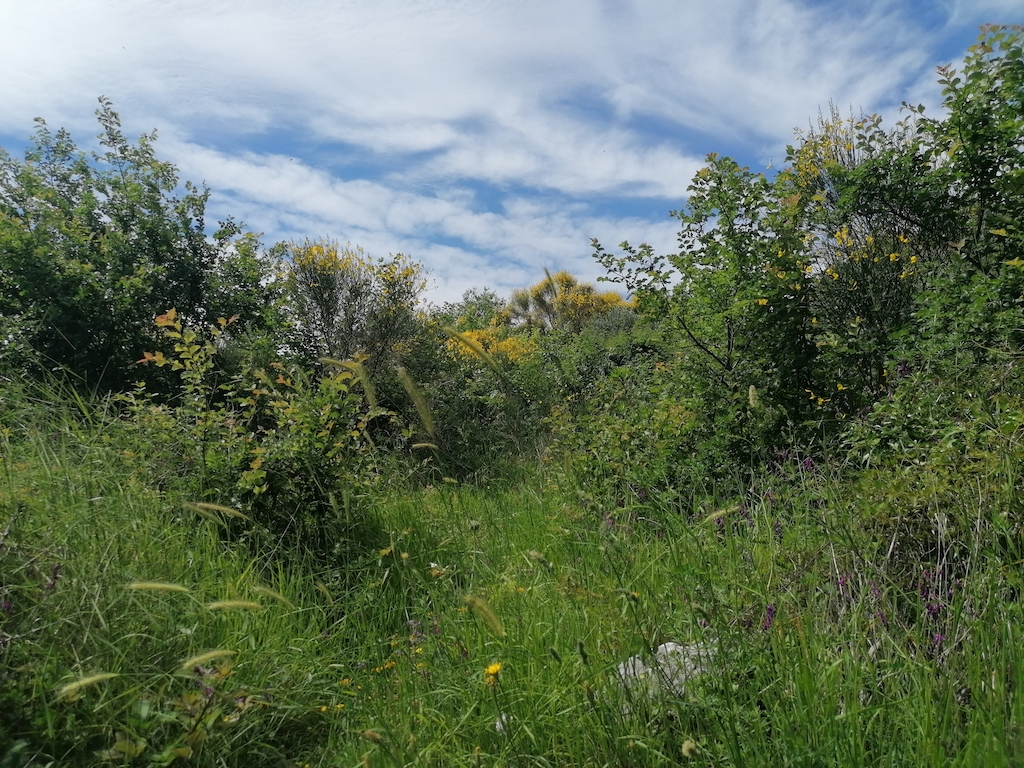
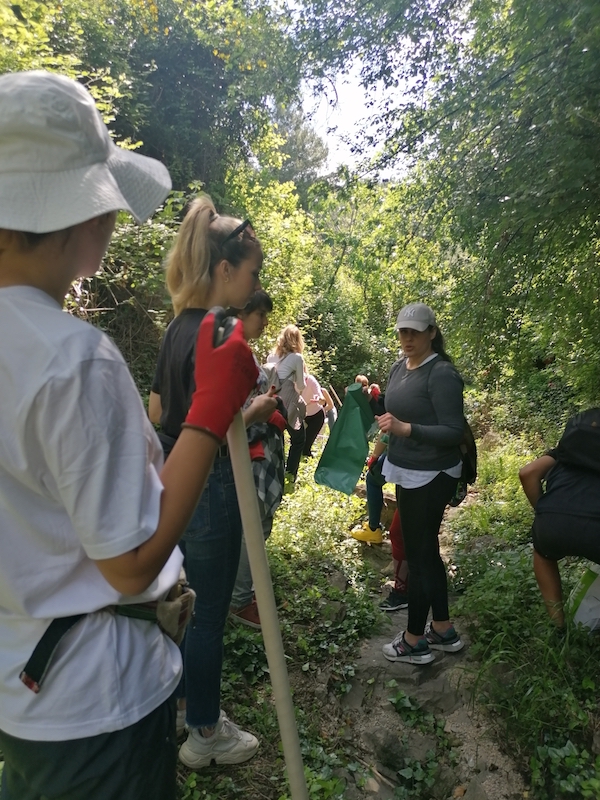
I was invited to participate in the cleaning action by my friend from 'Sunce', then I invited my colleague from the Split scout association. In fact, I was waiting for my friends from Zagreb to come to Split for a weekend, as I got an invitation. My friends were going to relax in sunny Split - for one of them it was supposed to come to Dalmatia for the first time - and I was thinking about an easy beach & bar program for them. But then I decided that Saturday cleaning in the suburbs would be a nice beginning of the weekend. Actually, it shows that our lovely Split is not only a tourist spot to chill, it's a city that cares about the ecology and provides an enabling environment for living.
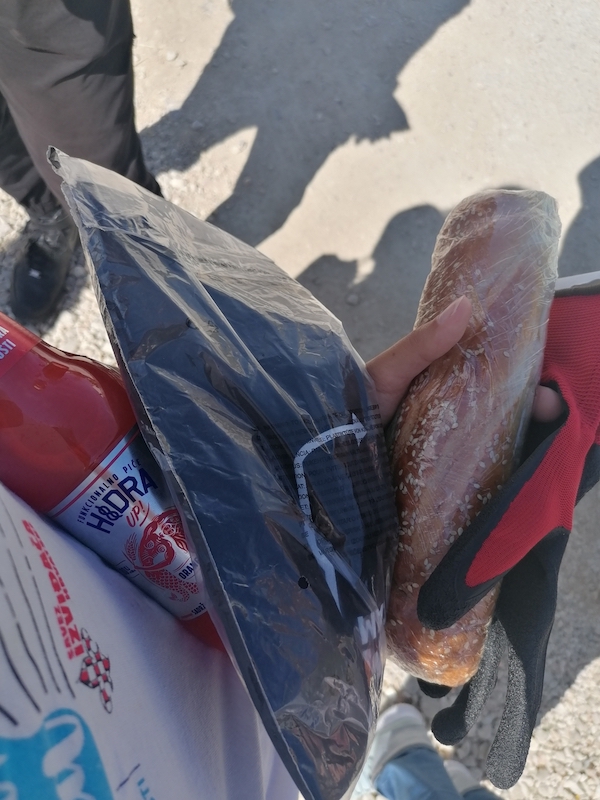
We met with 'Sunce' staff at 09:00 am and came to the garbage dump in Solin at 09:30. Offhand, half of the volunteers came from Split and a half from Solin. Among volunteers, there were local people from the Split neighborhoods as well as expats from North Macedonia, Russia, Italy, and Germany. Some staff of the Zagrebačka pivovara office located in Dugopolje joined us too. In sum, we were around 25 people on the first Saturday, 22 May, and around 10 people on the second Saturday, 29 May. Therefore, the first Saturday team handled all the garbage in a little over two hours, while the second team used all the time allotted (4 h).
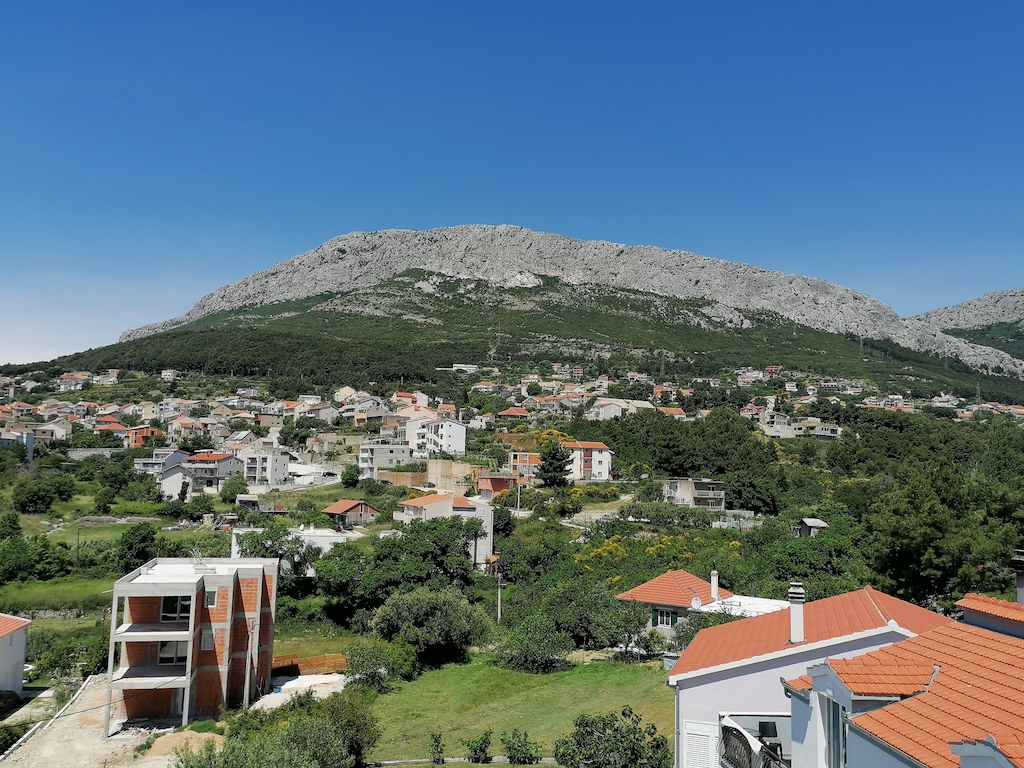
Zagrebačka pivovara provided us with cleaning tools, protective gloves, corporate identity t-shirts, and some snacks and non-alcohol drinks at the beginning. Within two hours we collected about 30 large garbage bags. By the way, we have learned that it's easier to clean dense clusters of garbage, probably, typical weekend grill places, than garbage disseminated along the road. My first finding was a funny child's toy. The second finding was a thrown can of Ožujsko pivo. My friends competed to find the oldest soda can or bottle. If I'm not mistaken, a Coke from1993 won this competition.
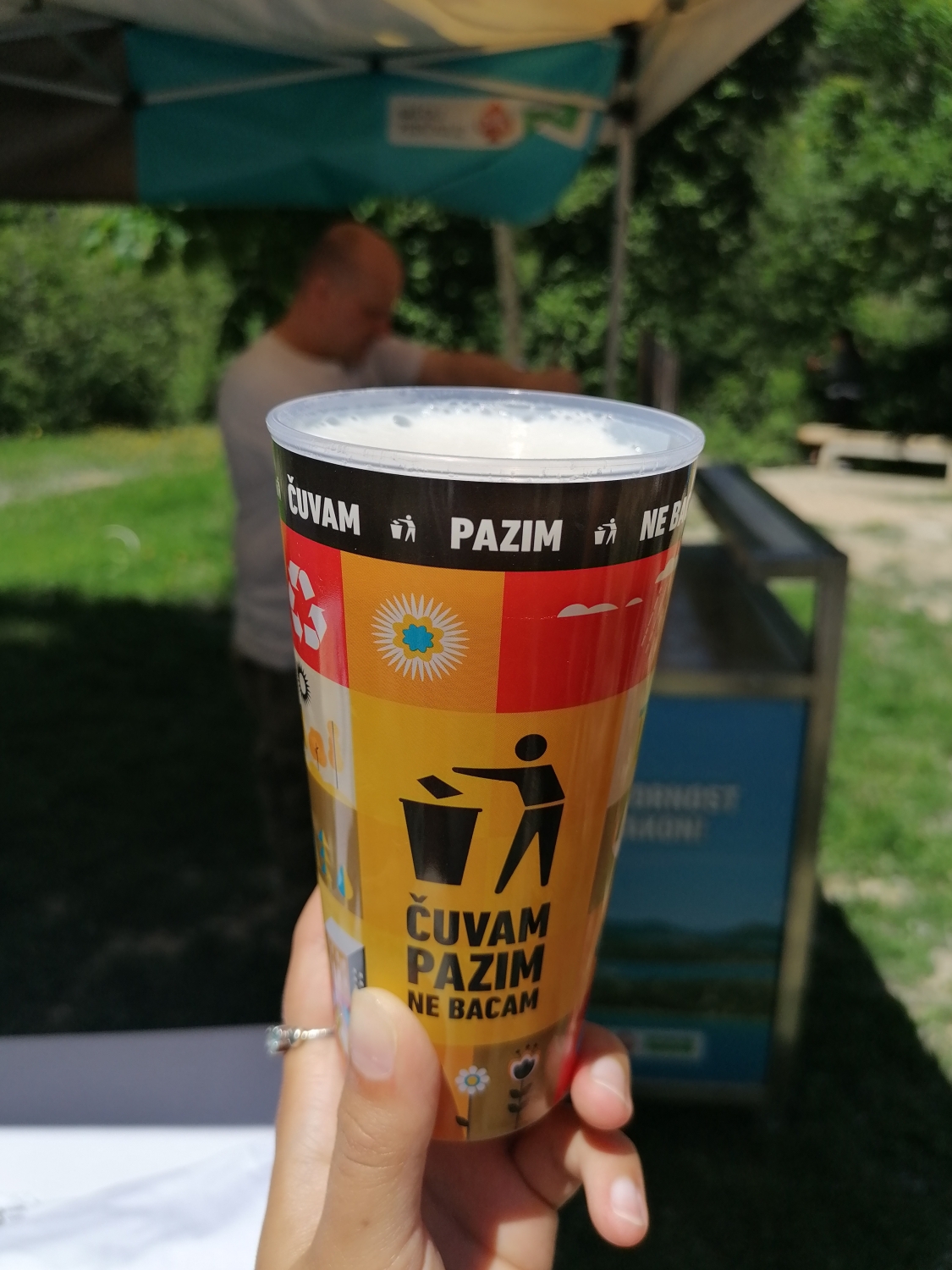
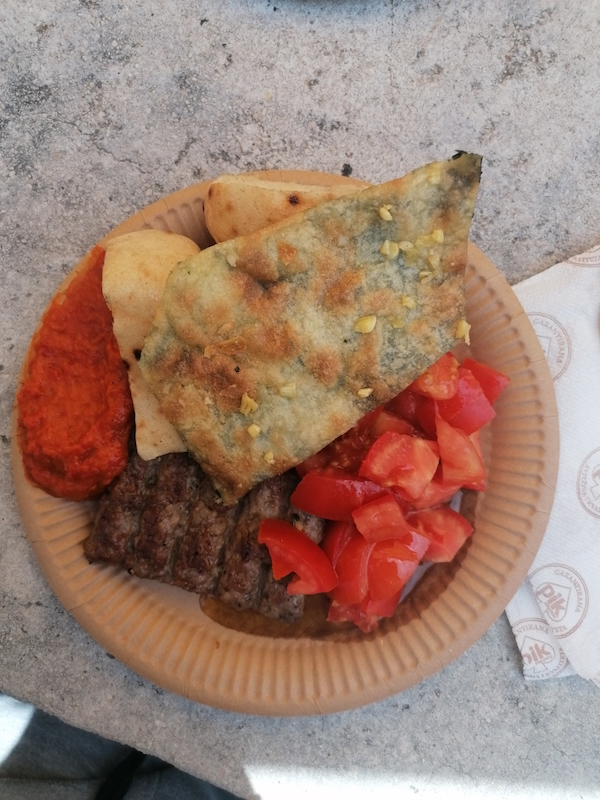
With all the garbage bags filled, we created a live chain and put it together on the side of the road from where it will be taken for disposal. I really enjoyed the atmosphere of solidarity and cooperation in our chain speaking in Croatian, Russian and German simultaneously. Upon cleaning, we moved to a beautiful nature place in Solin - Odmorište uz rijeku Jadro (Rest area along the Jadro river). There, Zagrebačka pivovara offered us a grill and beers in the fresh air. It was a good reward for good work and a great chance to get to know the people you're volunteering with.
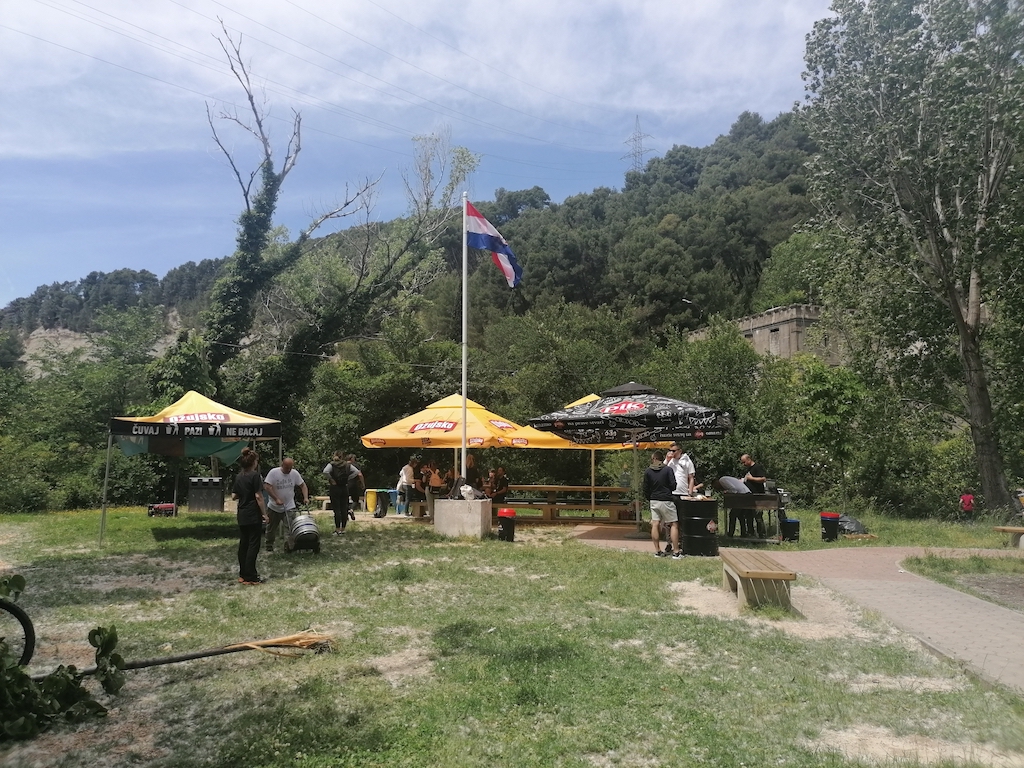
For more, follow our lifestyle section.
Volunteer at Mljet National Park for 7 Days Beautiful Island Exploration
February 14, 2021 – Want to spend 7 days making your way across one of Croatia's most unique island landscapes? Volunteer at Mljet National Park and get a week's free accommodation, with English speaking and Croatian speaking volunteers both welcome
Recently ranked by global player Forbes as among the top five Mediterranean undiscovered islands, Mljet can be yours to explore for free if you have some free time on your hands. Mljet National Park is looking for volunteers to help clear and maintain hiking trails on the island. If you volunteer at Mljet, you'll get seven nights of complimentary accommodation, plenty of free time and the opportunity to make your way across one of Croatia's most beautiful and unique island landscapes.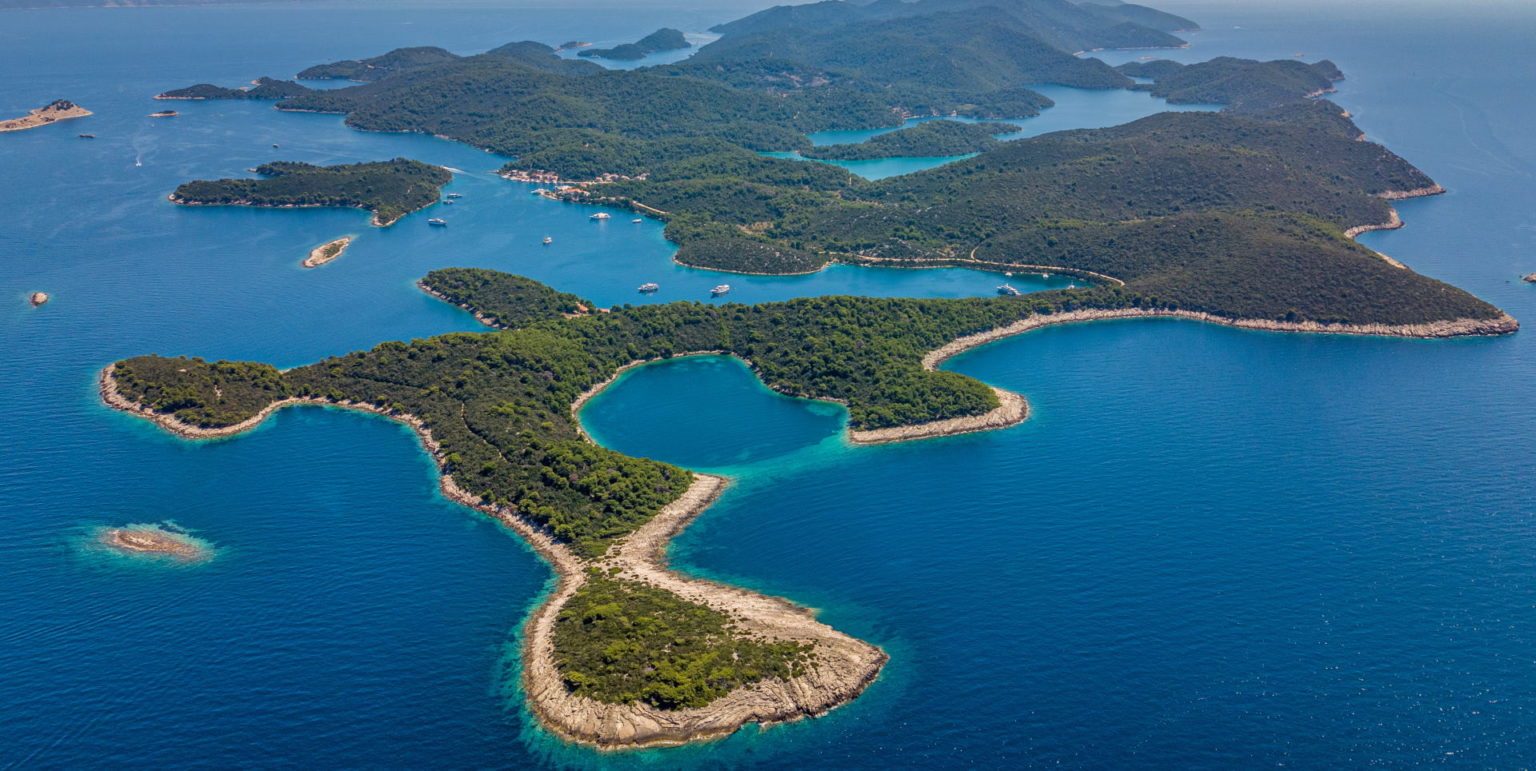 © Mljet National Park
© Mljet National Park
Those who volunteer at Mljet National Park will get to explore the entire north-west part of Mljet island, a protected area of stunning natural beauty that borders two famous saltwater lakes –Veliko Jezero and Malo Jezero which stretch 4 kilometres into the island's interior. In the middle of the largest lake, there is a small island, Melita (Sveta Marija) on which a 12th-century Benedictine monastery picturesquely sits.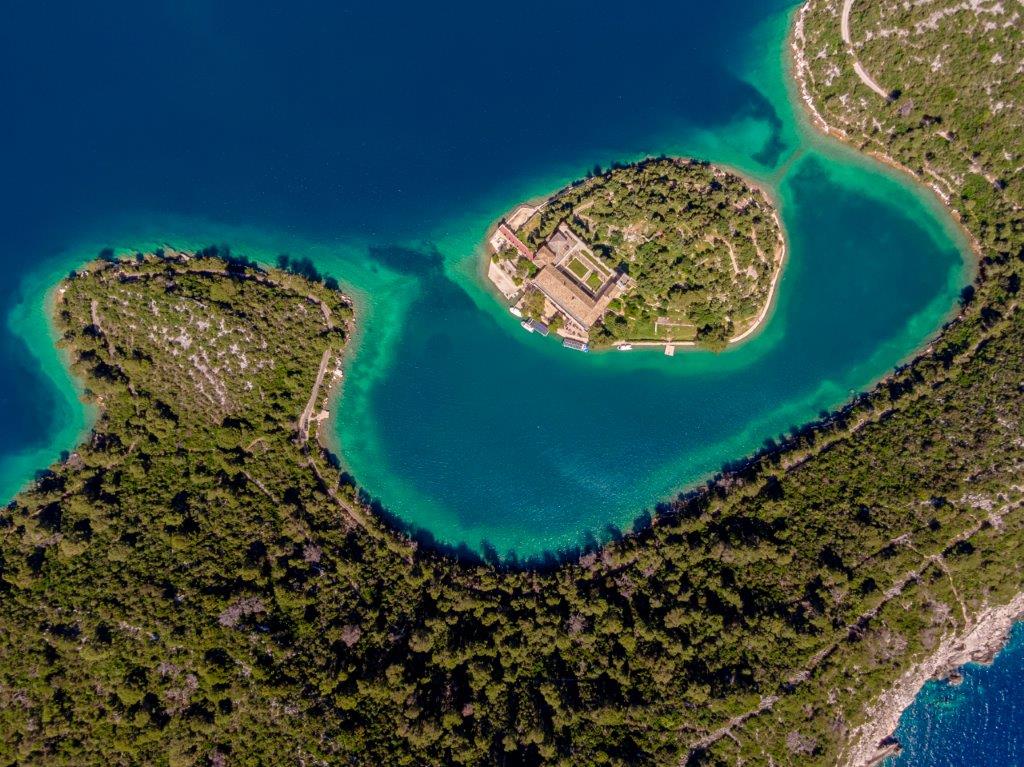 The island of Sveta Marija © Mljet National Park
The island of Sveta Marija © Mljet National Park
The oldest marine protected area anywhere on the Mediterranean, as Mljet National Park stretches over almost 5300 hectares, there's no guarantee these spectacular lakes will be within your view as you volunteer at Mljet. But, you will have plenty of time to explore the park and the island's incredible sights – volunteering hours are restricted to just six hours per day.
Over 40 kilometres of hiking trails run along the shoreline and through the forests of the park. Those who volunteer at Mljet will be asked to clear trails that have become obstructed by winter's strong winds blowing down trees and branches. Any equipment needed for the tasks, like compulsory work gloves, hats and t-shirts, will be provided by park authorities to all who volunteer at Mljet.
The groups required to volunteer at Mljet will be comprised of no less than 6 people and no more than 12 people at a time. You can apply to volunteer at Mljet alone - and maybe make some new buddies - or you can apply to go with a friend or friends. Both English speakers and Croatian speakers are invited to apply. Free accommodation is supplied in the Cullier building, owned by the Park. There are 7 rooms with bunk beds, toilets, showers, kitchen, living room. The building is just 2 km away from the village of Pomene, which has the only hotel on the island, several restaurants and two shops that are open during the summer. All meals are also provided free to those who volunteer at Mljet.
When can I volunteer at Mljet National Park?
Volunteer positions are available between February and November with the following being the specific weeks:
27/02 - 06/03
06/03 - 13/03
21/03 - 27/03
27/03 - 03/04
10/04 - 17/04
17/04 - 24/04
15/05 - 22/05
11/09 - 18/09
25/09 - 02/10
02/10 - 09/10
09/10 - 16/10
Volunteering lasts 7 days, one day of which is a free day - you can explore the park or take part in a tour of the island which the park organises as thanks to all volunteers. Volunteers will work 6 hours a day for the 6-day duration, although this 6 hour period does include one full hour of rest time. If there are unfavorable weather conditions (strong sun, wind, etc.) working hours may be reduced. Volunteers require only physical readiness and the desire to stay and work within a natural, outdoor environment. As the volunteering work requires physical strength and dexterity, these particular positions at the park are sadly not open to those with disabilities. Local transport within the Park is provided. Travel expenses for arrival and departure from the Park are borne by the volunteers themselves.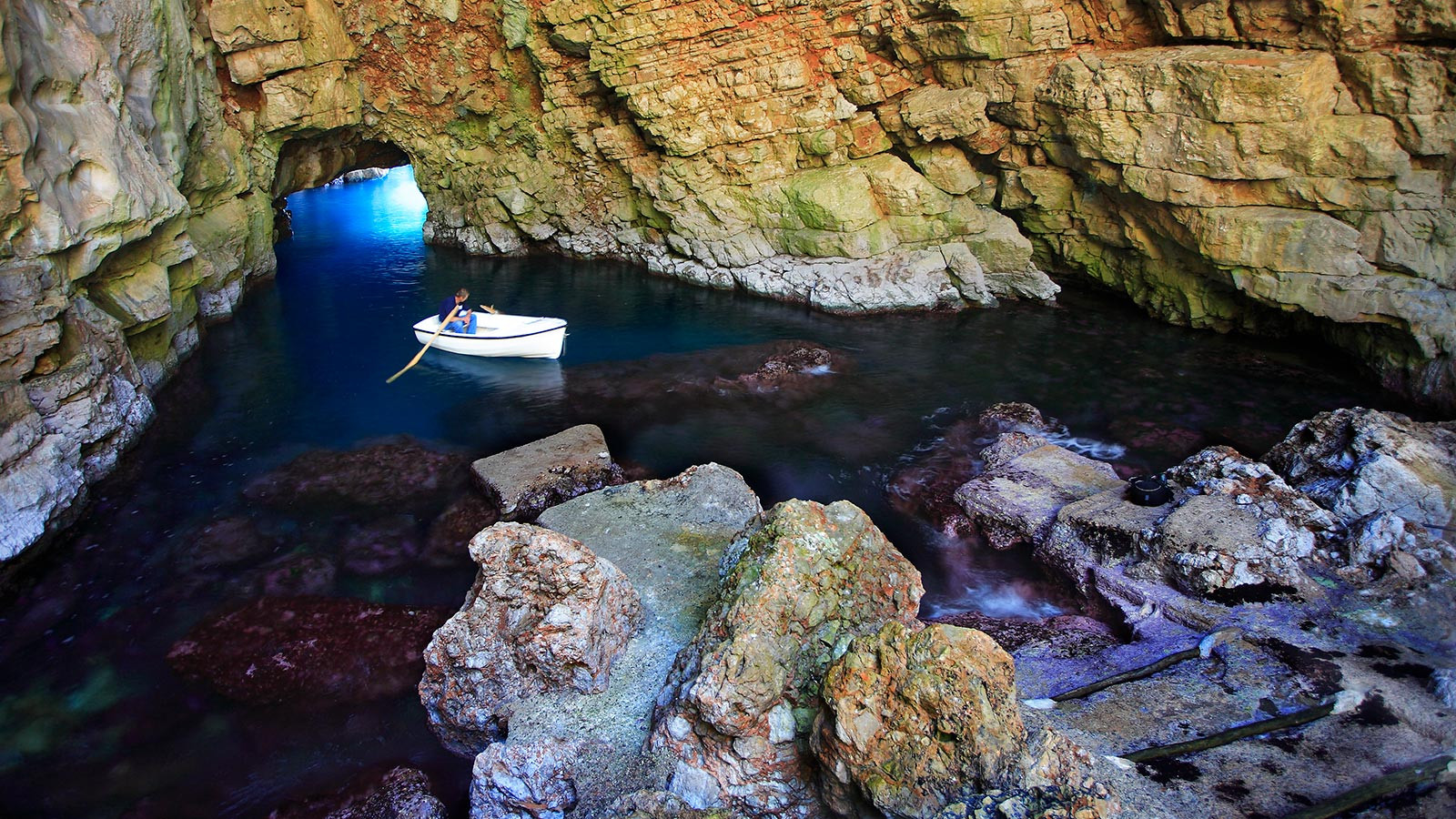 The Ulysses cave on Mljet island © TZ Mljet
The Ulysses cave on Mljet island © TZ Mljet
During the free time you'll have on the island, you can walk, hike or bicycle on the park's trails, rent kayaks and canoes to explore the stunning saltwater lakes, go diving or take diving lessons, rent a scooter or car to explore the whole island and its many sights, or just chill out with your fellow volunteers, park staff and the park's visitors at the accommodation centre or in a local tavern.
Want to extend your stay in Croatia by a week with free accommodation on an incredible island? Got some free time on your hands and an appreciation of the great outdoors? If this opportunity sounds like it might be for you, you can fill in a form and apply here
Meet Zagreb Volunteers, the Heart and Soul of the City
October 29, 2020 - TCN joins Zagreb Volunteers Centre in Čučerje to find out who are the Zagreb volunteers and why they do what they do. Čučerje is a semi-rural community which lies at the epicentre of the March 2020 earthquake.
By the time we ran out of the building, the first tremor had stopped. At 6:25am, the asphalt road lay quiet and motionless. People in pyjamas, nightgowns or underwear stood on the pavement. Others emerged even later. Although masonry in other parts of the city continued to fall, the 5.5 magnitude earthquake that visited Zagreb on 22 March 2020 was over. It had lasted much less than a minute. Its repercussions would last much longer.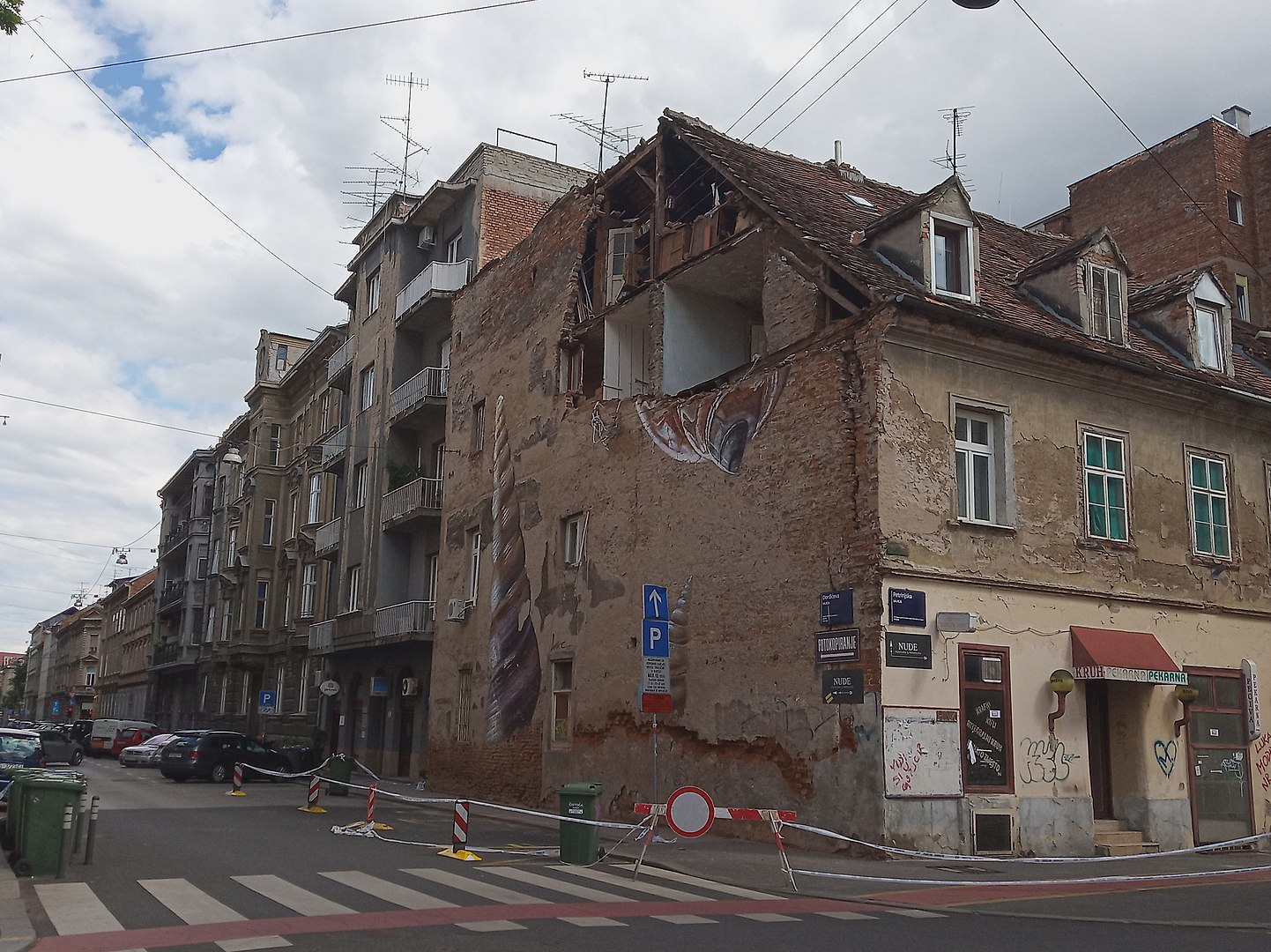 Damage to a Zagreb city-centre building in the 2020 earthquake © Franjo Tahy
Damage to a Zagreb city-centre building in the 2020 earthquake © Franjo Tahy
The tragic news of a fatality filtered through the media several hours later, as did pictures of the devastation visited upon the Croatian capital's buildings. Some of its oldest were hit particularly hard. However, most modern constructions had emerged largely unscathed. Acknowledging the area's seismic capabilities, everything built after the 1963 earthquake of Skopje in neighbouring Macedonia had been constructed to withstand such force.
Offers of help soon began to arrive from overseas. Despite international struggles related to Coronavirus, many still had sympathy upon hearing of the Zagreb earthquake. This outside sympathy and the media that prompted it were rarely directed to the semi-rural communities which experienced the earthquake's fiercest force.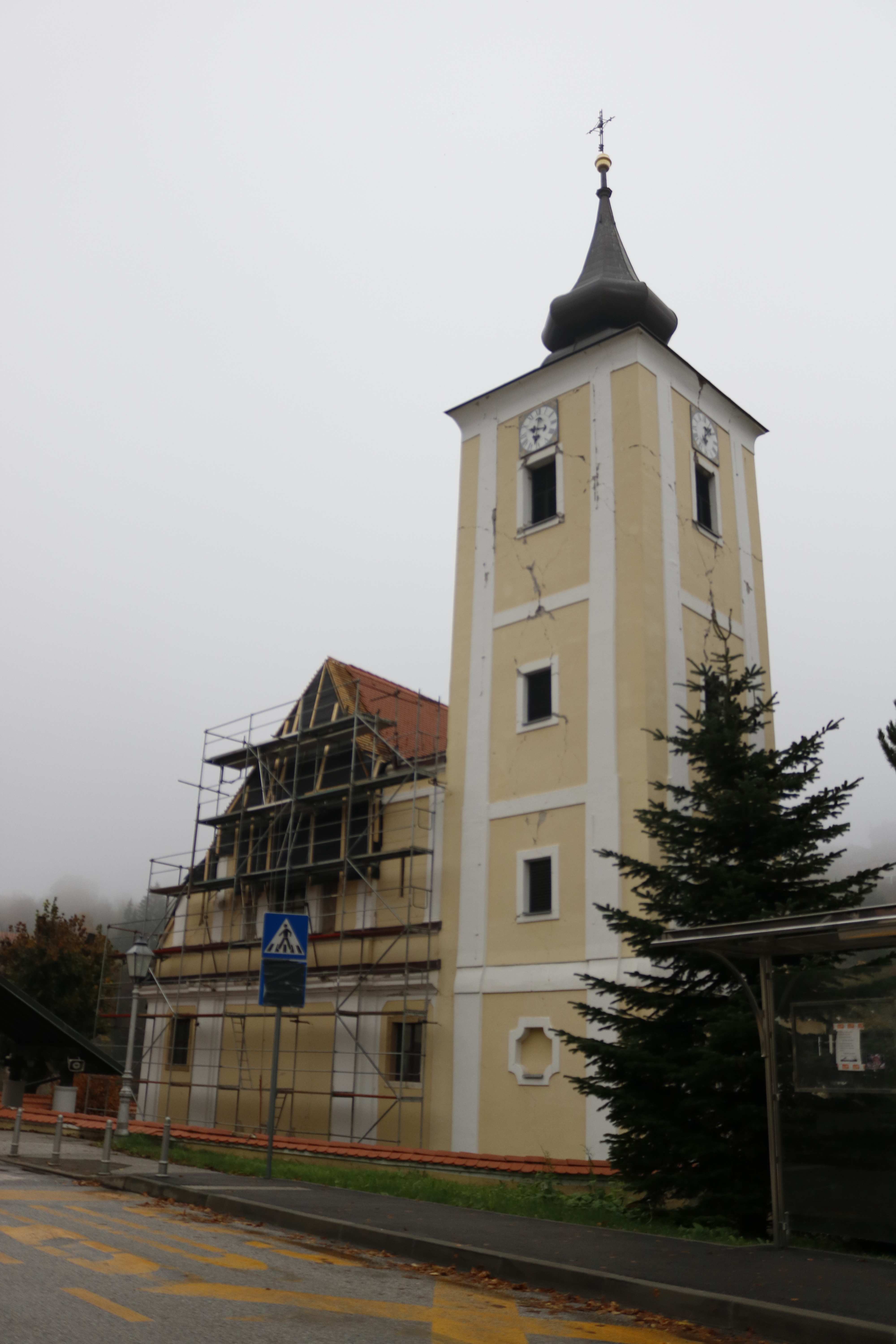 The front of the town church in Čučerje, surrounded by scaffolding seven months after the earthquake
The front of the town church in Čučerje, surrounded by scaffolding seven months after the earthquake
The small town of Čučerje is just short of 11 kilometres to the north-east of Zagreb city centre. In late October, the town looks impossibly pretty – houses perched in the foothills of Mount Medvednica, surrounded by greenery and trees exploding in a myriad of autumn shades. But, behind the colourful exterior lies a hidden suffering.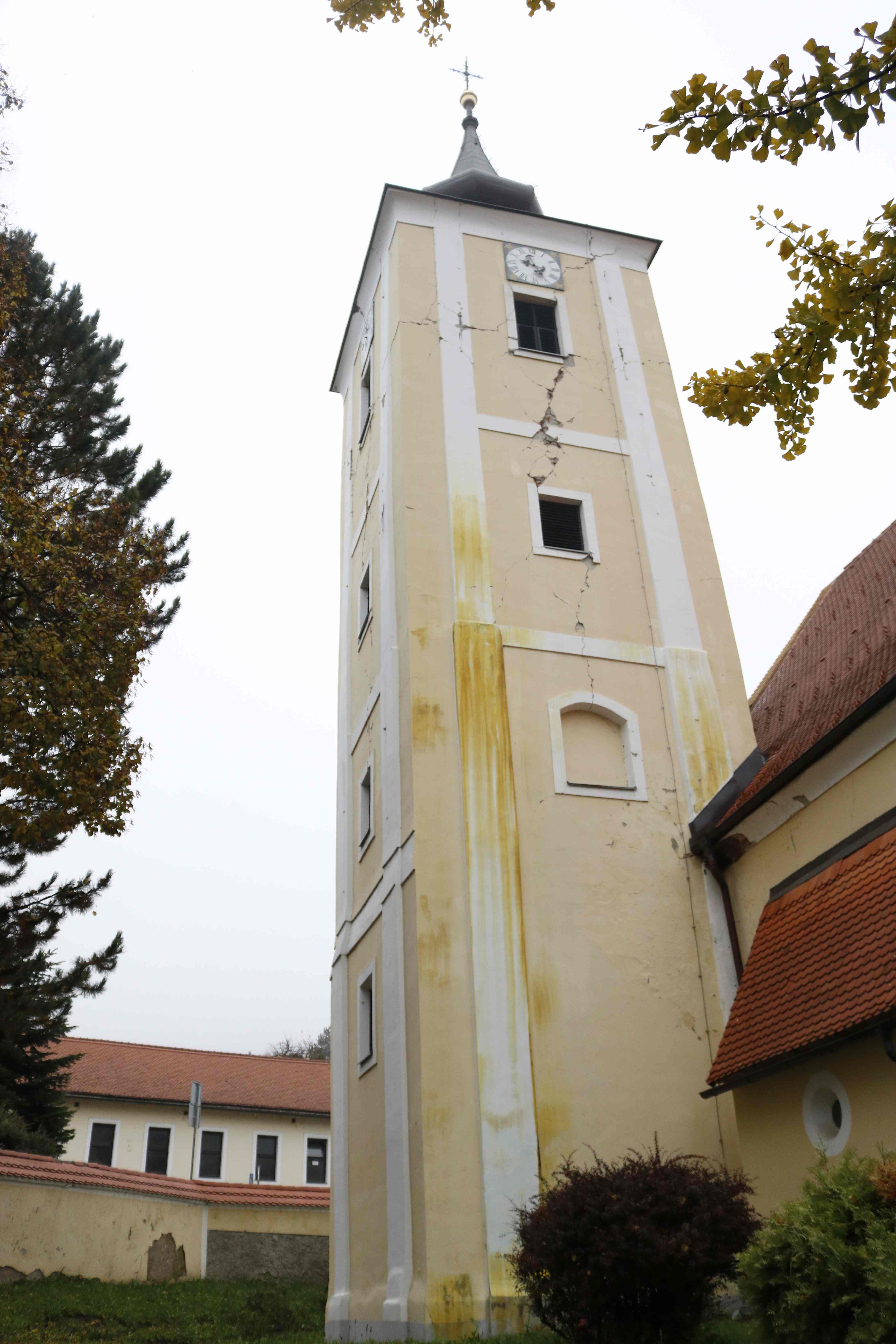 The spire of Čučerje's church is scarred on all sides by long-veined cracks
The spire of Čučerje's church is scarred on all sides by long-veined cracks
Čučerje lies just 500 metres from the epicentre of the earthquake. Scaffolding bolsters the town church, its spire scarred on all sides by long-veined cracks. Back from the main road, down simple, country lanes, sit houses much older than those standng proud above the centre. Here, life still exists in a way similar to that of the original residents of such dwellings. Elderly neighbours are preparing to heat their homes by wood-fired burners, chasing away the chill seeping in through the cracks the earthquake has left. As winter approaches, such hardships are not always reported as loudly as those faced by the damaged cultural institutions holding priceless collections in the capital. But, the struggle does not go unnoticed by Zagreb Volunteers Centre (VCZ).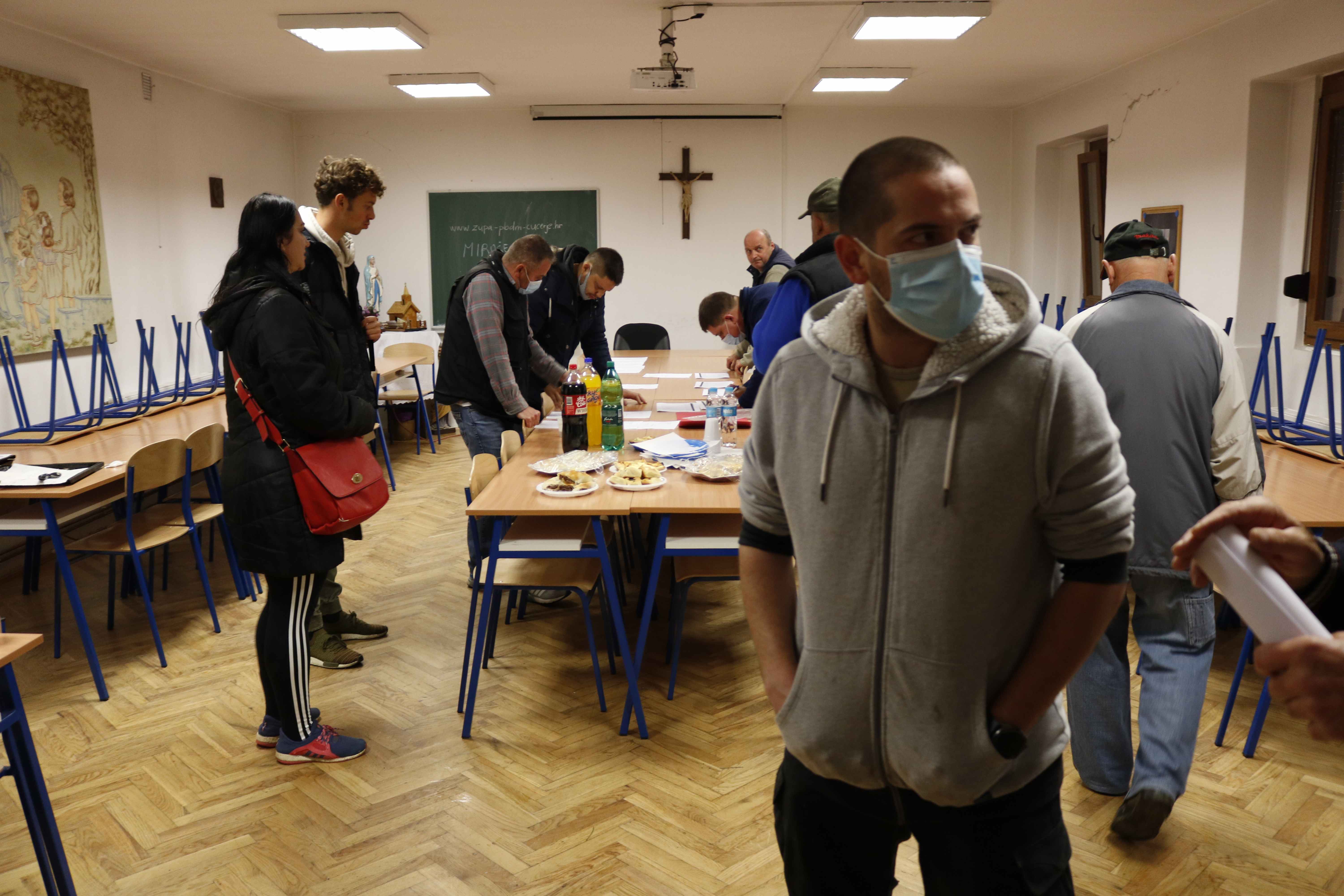 Čučerje residents and members of Zagreb Volunteers Centre meet in the community centre to plan the day's action
Čučerje residents and members of Zagreb Volunteers Centre meet in the community centre to plan the day's action
Established in 1998, Zagreb Volunteers Centre acts as a conduit between charities, communities and non-profit organisations who need support and those willing to donate their time to good causes. Since it was formed, over 18, 000 people have submitted their names to the centre as potential Zagreb volunteers who may be called upon. The centre has helped over 700 organisations find Zagreb volunteers.
“Before 1996, there was a set-up that facilitated international volunteering - it helped connect Croatians with international actions that were looking for help,” says 28-year-old Dunja Hafner, who works for Zagreb Volunteers Centre. “But, it was noticed that some people couldn't commit to an overseas trip and that others simply just preferred only to volunteer locally. The logical step was to move into facilitating that.”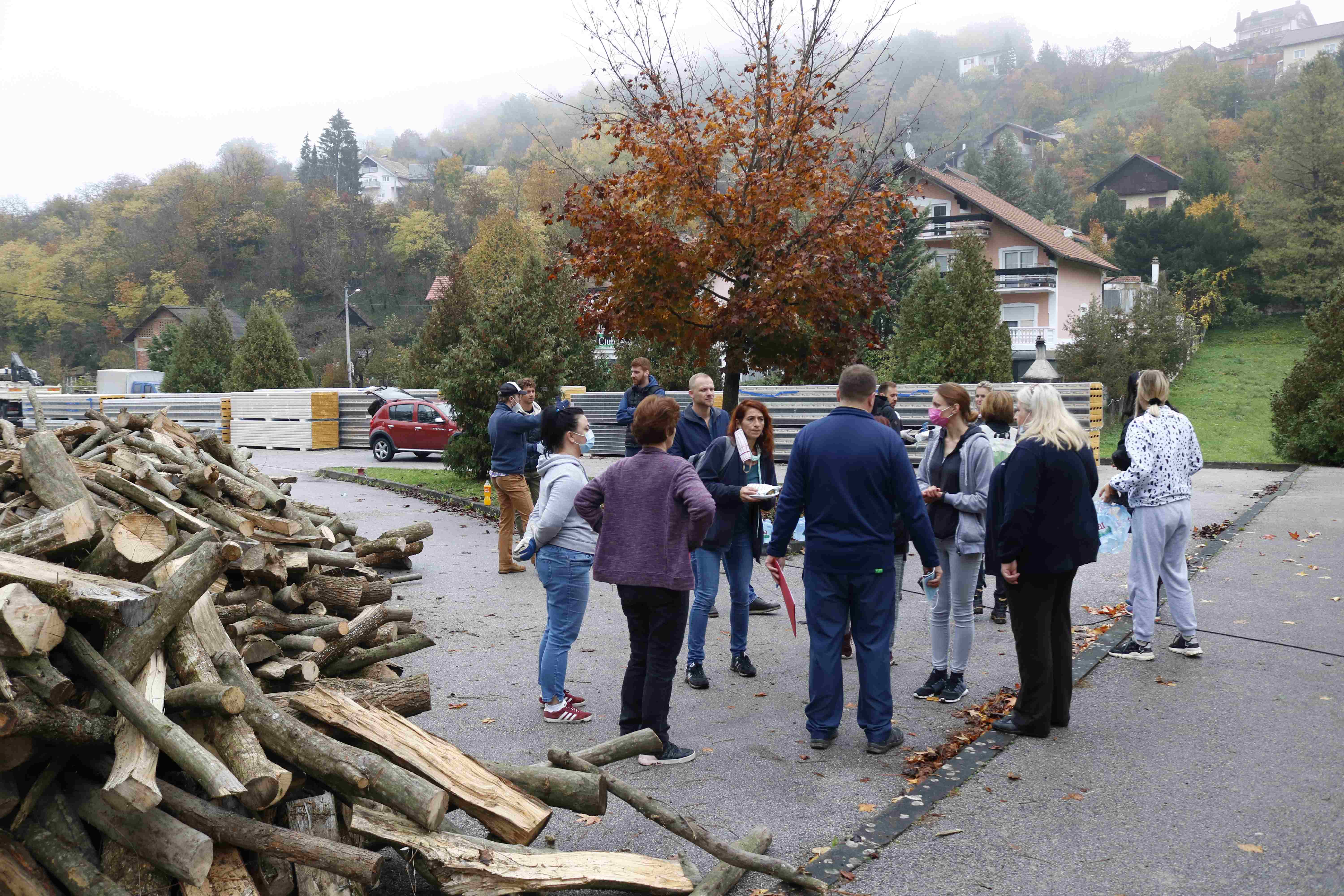 Zagreb volunteers gather in the early morning mist
Zagreb volunteers gather in the early morning mist
“Since we started, the numbers of Zagreb volunteers in our database has grown steadily. But, over more recent times, volunteering does seem to have become a more popular thing to do. And, many people have put their names forward for volunteering since the advent of the earthquake. In the immediate aftermath, there were so many people volunteering that we had to just direct people to the specific groups who were appealing for help. We even had to turn down some Zagreb volunteers who offered their time. That had never previously happened in the history of the organisation. Now, we are managing better and we help co-ordinate some of the actions ourselves.”
“Before the earthquake, the main volunteering areas to which we would send people were actions for children, the elderly, events like culture, sports and music festivals, animals, ecology projects and nature conservation.”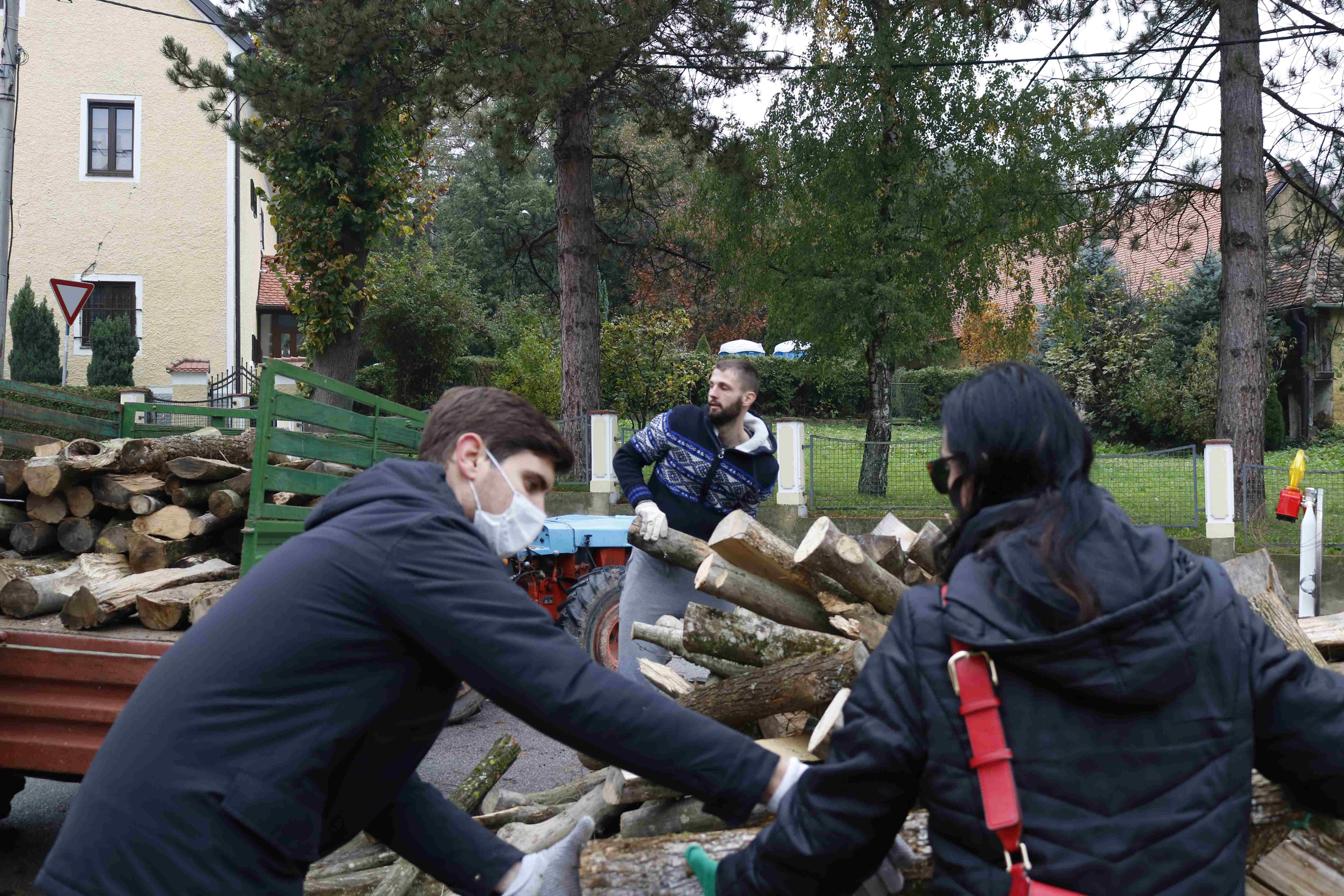 My name is Dražen Blažević (centre), I was born in Croatia. My mother and grandparents are all from Zagreb. This is the city where I live. At the moment, I don't have regular employment, so I can afford to give my time to an action like this. While I'm looking for a full-time job, I make ends meet by doing food deliveries on my bicycle. Why am I here today? Honestly, it was only two weeks ago that I just had this feeling that I should give my time to help people. In one minute I decided I would volunteer. Before this, the kind of help I would give was only to my neighbours, the elderly relatives of friends. People like that. As an official volunteer, this is my first time. Maybe this sounds a little selfish, but I thought it would make me feel good.
My name is Dražen Blažević (centre), I was born in Croatia. My mother and grandparents are all from Zagreb. This is the city where I live. At the moment, I don't have regular employment, so I can afford to give my time to an action like this. While I'm looking for a full-time job, I make ends meet by doing food deliveries on my bicycle. Why am I here today? Honestly, it was only two weeks ago that I just had this feeling that I should give my time to help people. In one minute I decided I would volunteer. Before this, the kind of help I would give was only to my neighbours, the elderly relatives of friends. People like that. As an official volunteer, this is my first time. Maybe this sounds a little selfish, but I thought it would make me feel good.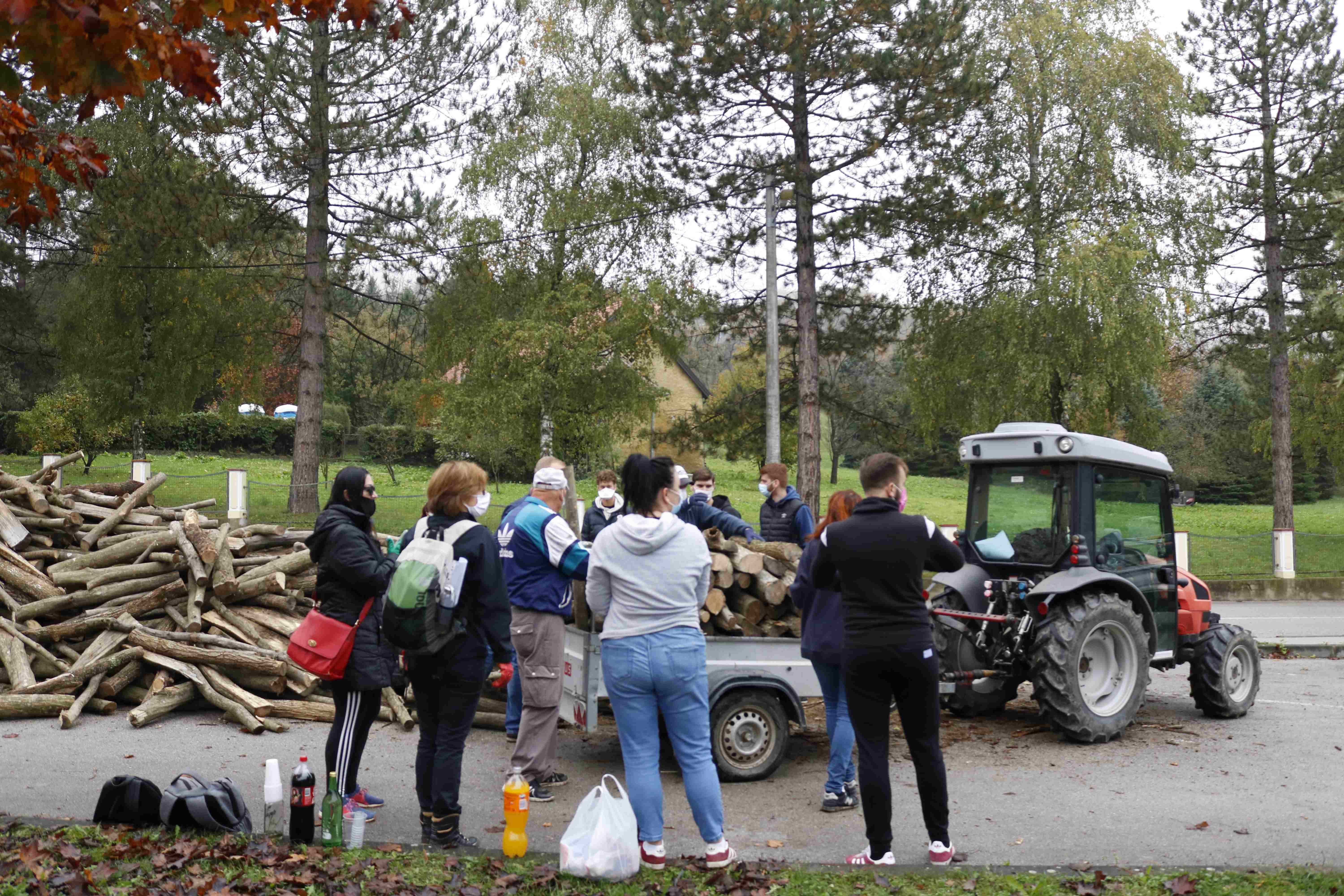
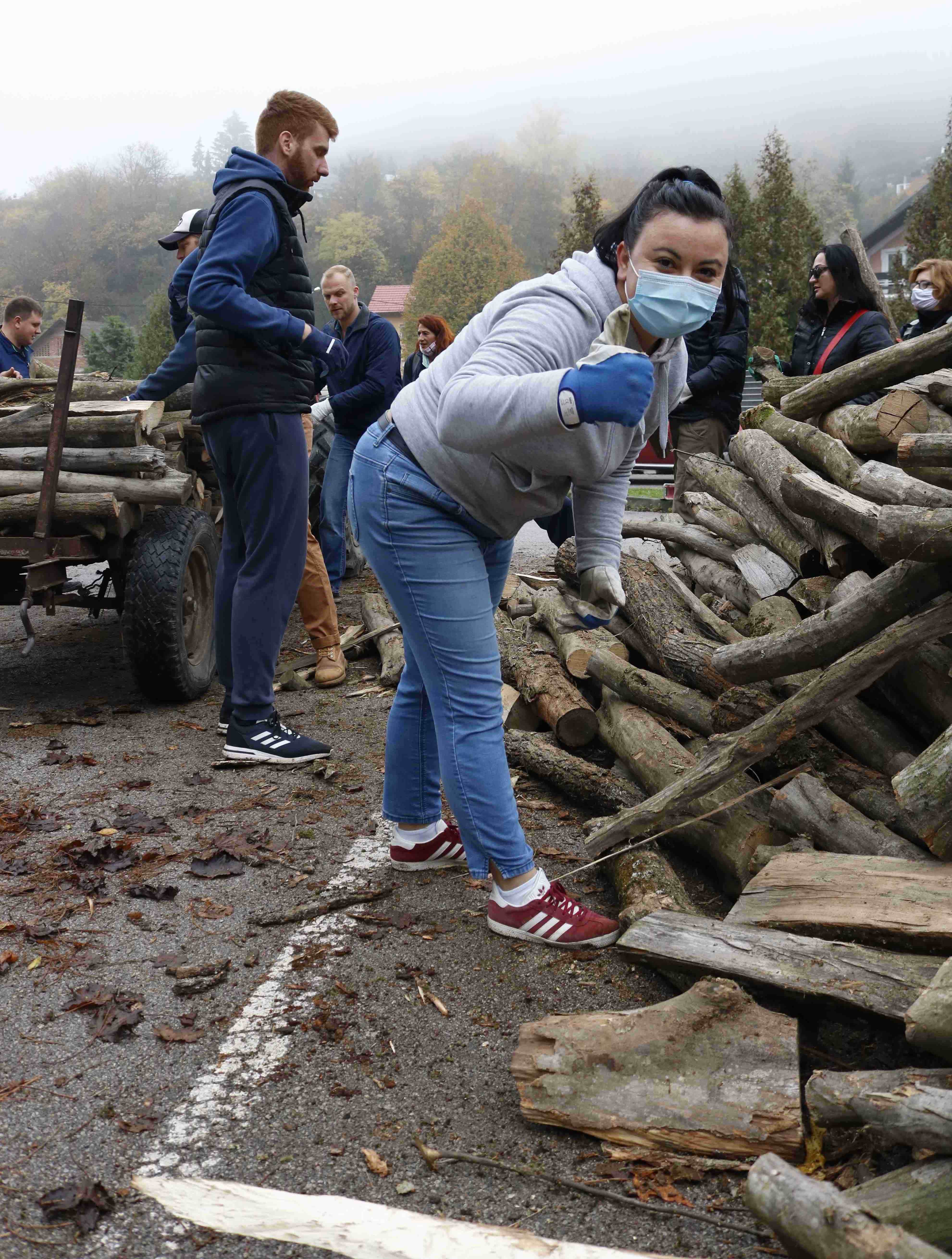 My name is Alexandra and I am from Čučerje. I live here with my family. Right now, I am without a full-time job, so I take on some other daily obligations – I accompany kids to kindergarten and school, and I help out in our local church. I look after their social media pages for them. I also play the organ in the church. It was a very simple decision for me to join in with today's action – I live here. I walk past the devastation left by the earthquake every day. This town has experienced lots of problems because of the damage. For me, giving my time today is a way of showing the love I have for my town and the people who live here. Well, something like that.
My name is Alexandra and I am from Čučerje. I live here with my family. Right now, I am without a full-time job, so I take on some other daily obligations – I accompany kids to kindergarten and school, and I help out in our local church. I look after their social media pages for them. I also play the organ in the church. It was a very simple decision for me to join in with today's action – I live here. I walk past the devastation left by the earthquake every day. This town has experienced lots of problems because of the damage. For me, giving my time today is a way of showing the love I have for my town and the people who live here. Well, something like that.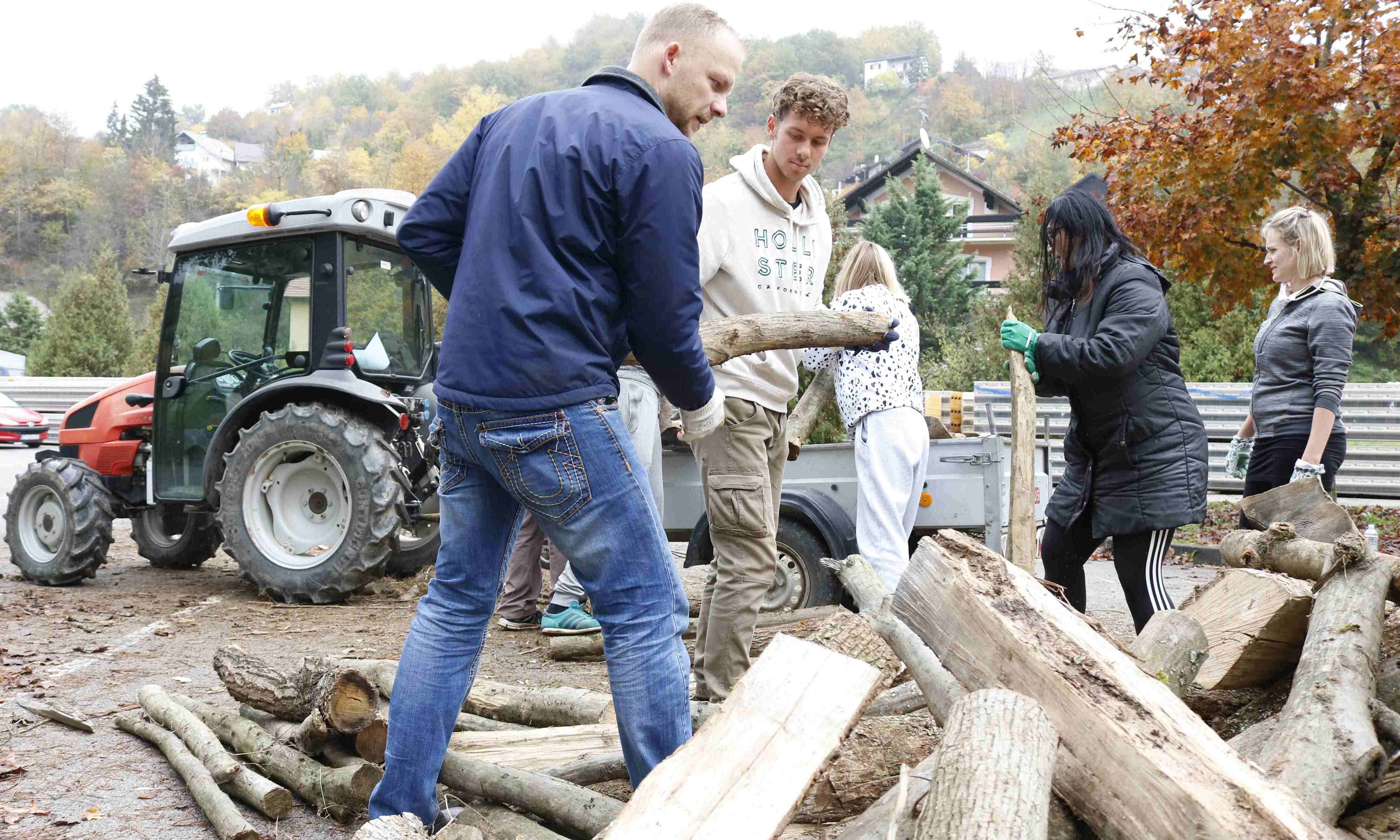
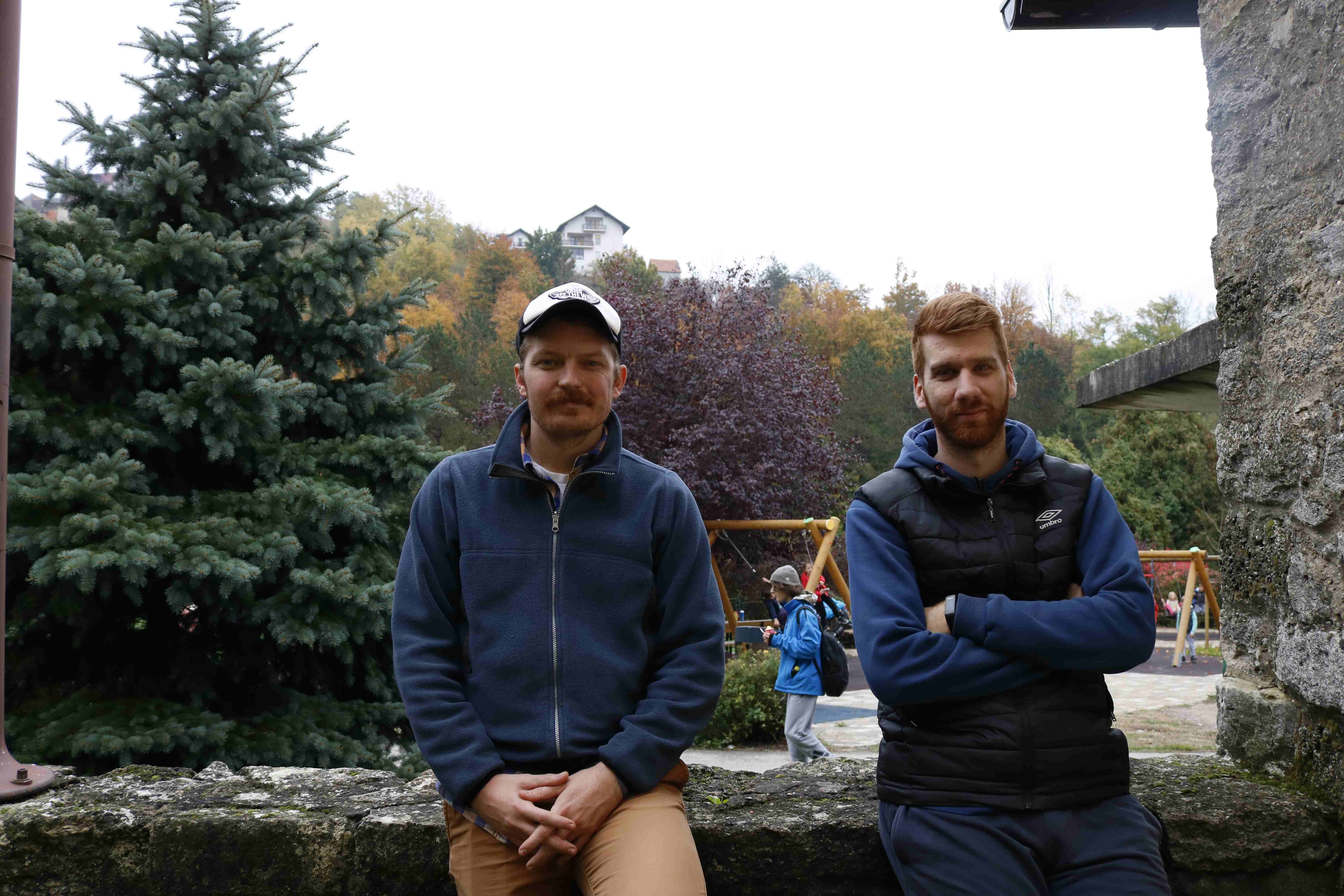 My name is Borut Babanić (right) and I'm from Zagreb. I work as a project manager. I wanted to volunteer so I could help people. The residents of Čučerje are some of the worst affected by the earthquake and so that's why I want to come here specifically. I wanted them to not feel that they are alone. This is the first time I joined an action via the Zagreb Volunteer Centre.
My name is Borut Babanić (right) and I'm from Zagreb. I work as a project manager. I wanted to volunteer so I could help people. The residents of Čučerje are some of the worst affected by the earthquake and so that's why I want to come here specifically. I wanted them to not feel that they are alone. This is the first time I joined an action via the Zagreb Volunteer Centre.
My name is Antonio Frinčić (left). I'm from Zagreb. I work for the Croatian Foundation For Children. It's an organisation that assists in looking after children and families who have small incomes or limited means. It's a state-funded organisation. My position there is a paid one. This is not the first voluntary work I've undertaken, but it is the first time I have volunteered through the Zagreb Volunteer Centre. My answer is the same as Borut's – I came here because I wanted to help these people.
Borut and Antonio are pictured side-by-side because they spent most of the day working together. When they arrived in the morning, they were strangers. They left as friends.
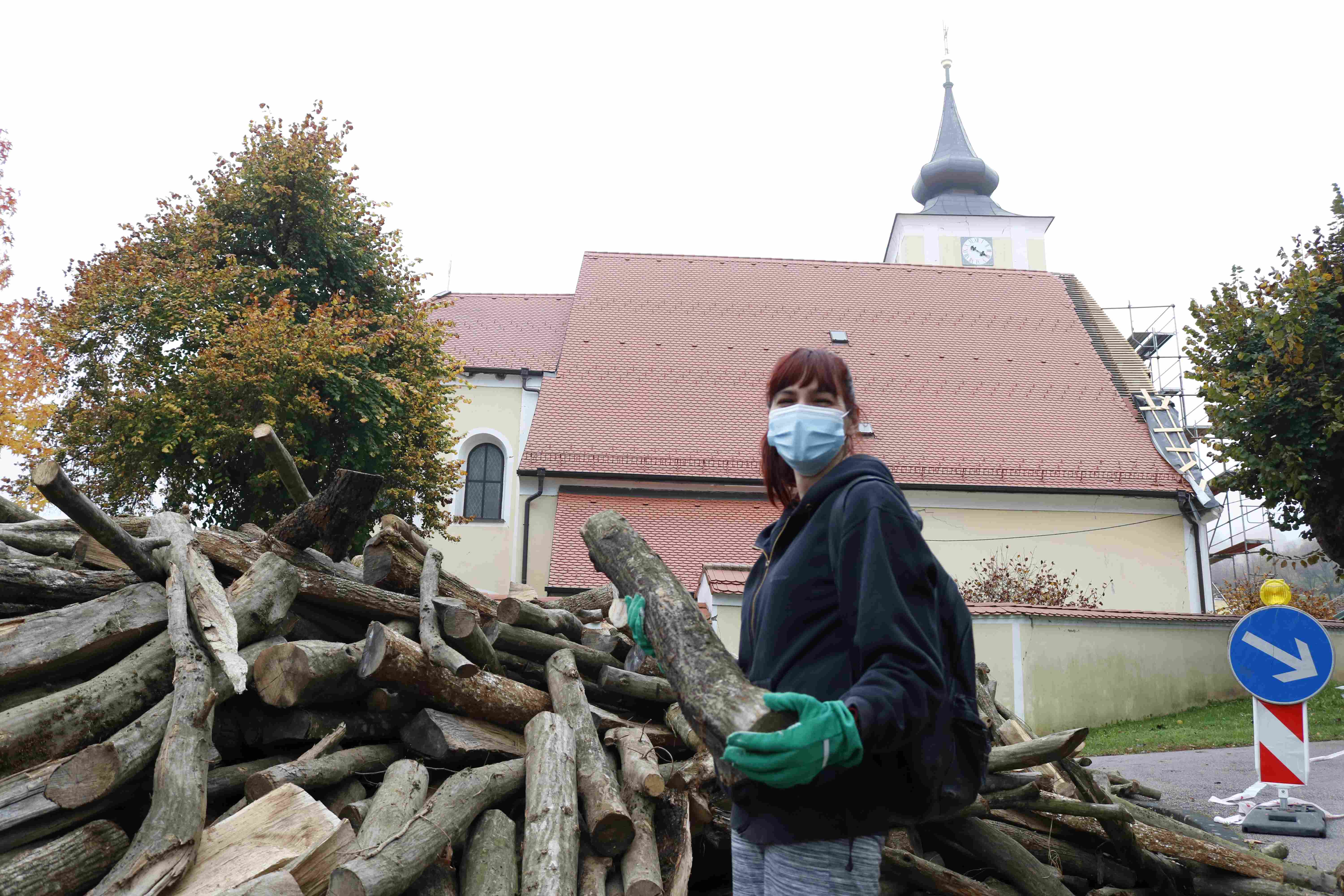 My name is Marina Krolo and I'm originally from Split. I studied in Zagreb, finished university here and then stayed. My regular role in society is that I'm a tour guide and tour leader. That pretty much means that this is my year off, ha! There's not much work for a tour guide in 2020, so I'm trying to put my free time to good use. This is the first time I've volunteered through Zagreb Volunteer Centre.
My name is Marina Krolo and I'm originally from Split. I studied in Zagreb, finished university here and then stayed. My regular role in society is that I'm a tour guide and tour leader. That pretty much means that this is my year off, ha! There's not much work for a tour guide in 2020, so I'm trying to put my free time to good use. This is the first time I've volunteered through Zagreb Volunteer Centre.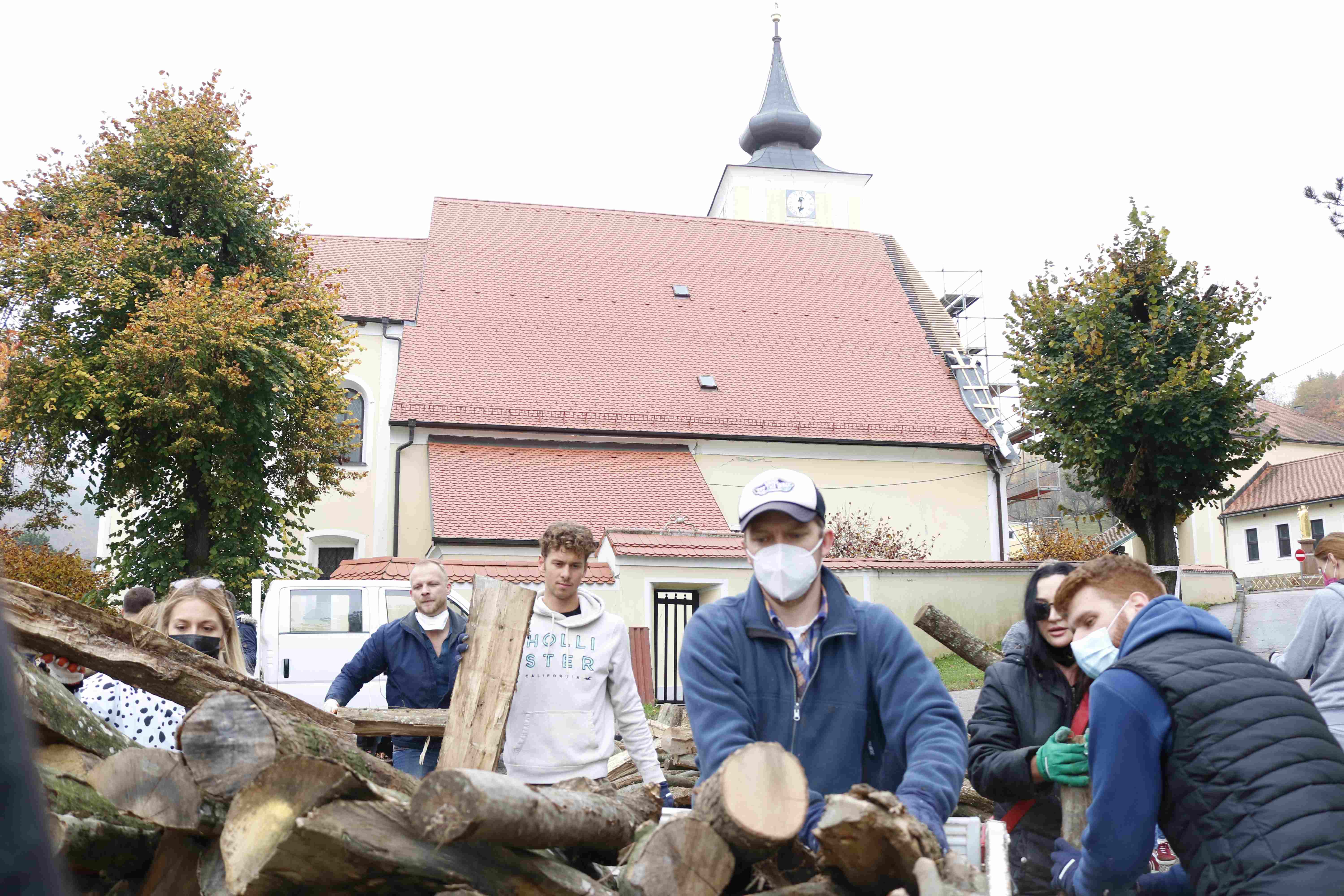
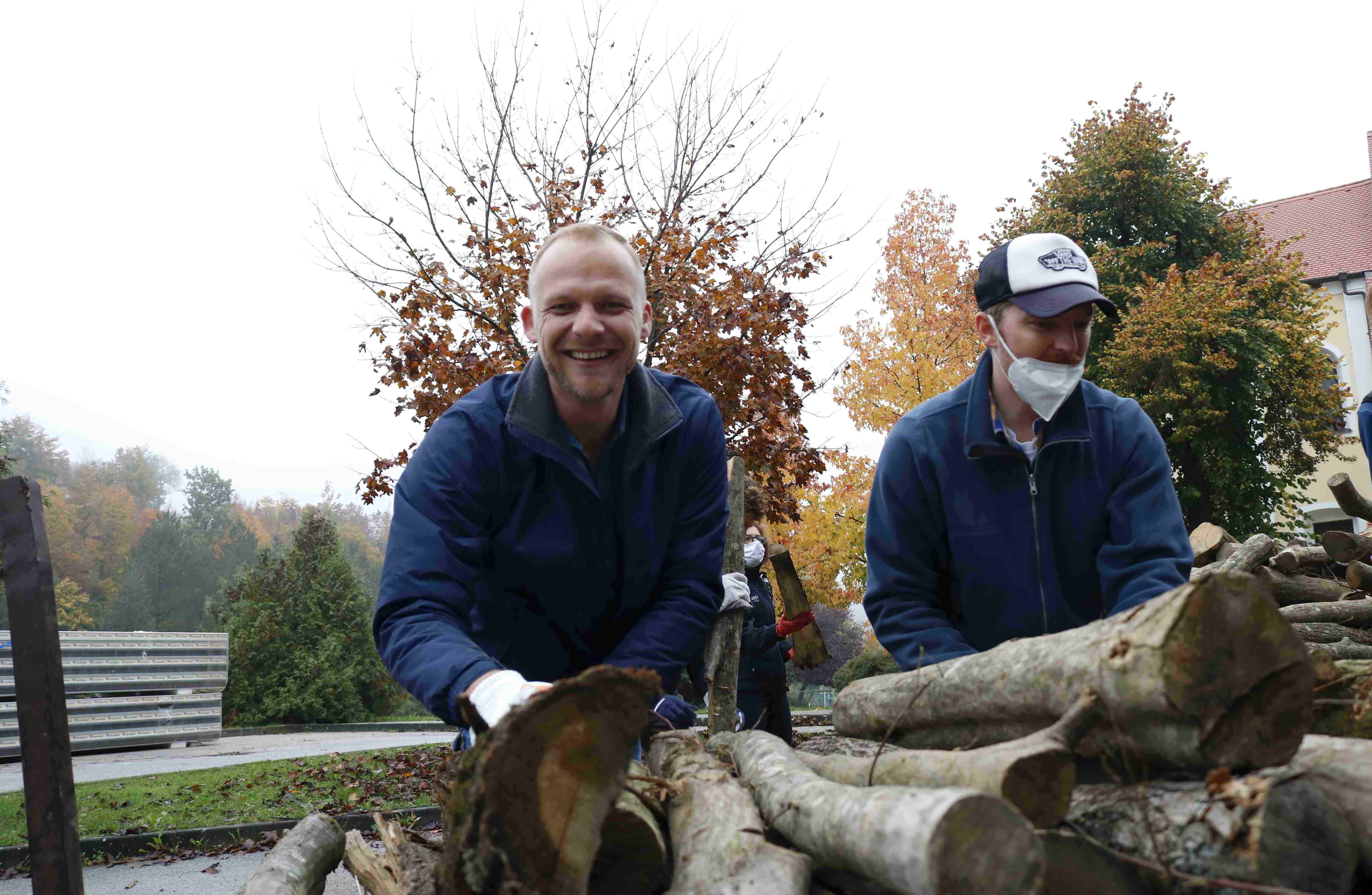 My name is Vincent Matijaca. I was born in Split. I'm based in Zagreb now. We opened a company BioCro LTD in the United Kingdom a few months ago. What we're trying to do is assist small producers and OPGs from this region to place their products internationally, including the UK and other countries in Europe. Why am I here today? Well, we believe that you can't start promoting sustainability and help solely from the office, we believe our project to be more hands-on. By doing that we hope to be able to show what we're about, and to set an example that perhaps others will follow. We've previously joined actions through other Croatian volunteer organisations and others internationally, but this is the first time we've done so through Zagreb Volunteer Centre.
My name is Vincent Matijaca. I was born in Split. I'm based in Zagreb now. We opened a company BioCro LTD in the United Kingdom a few months ago. What we're trying to do is assist small producers and OPGs from this region to place their products internationally, including the UK and other countries in Europe. Why am I here today? Well, we believe that you can't start promoting sustainability and help solely from the office, we believe our project to be more hands-on. By doing that we hope to be able to show what we're about, and to set an example that perhaps others will follow. We've previously joined actions through other Croatian volunteer organisations and others internationally, but this is the first time we've done so through Zagreb Volunteer Centre.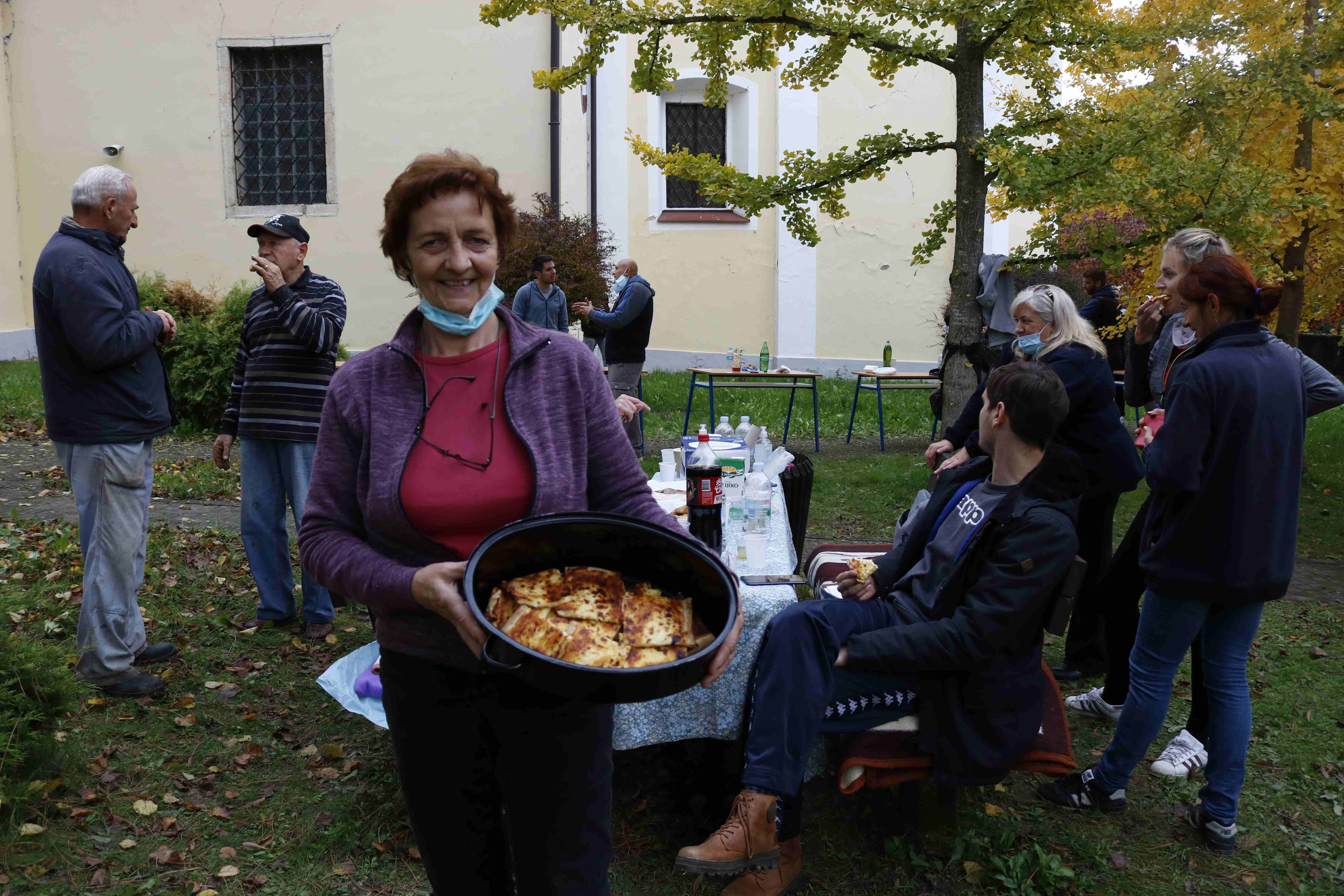 Local people from Čučerje and the surroundings had prepared food to make sure the volunteers didn't go hungry. This dish was made and donated by a local hairdresser. It is a local speciality called tenka gibanica. It was delicious.
Local people from Čučerje and the surroundings had prepared food to make sure the volunteers didn't go hungry. This dish was made and donated by a local hairdresser. It is a local speciality called tenka gibanica. It was delicious.
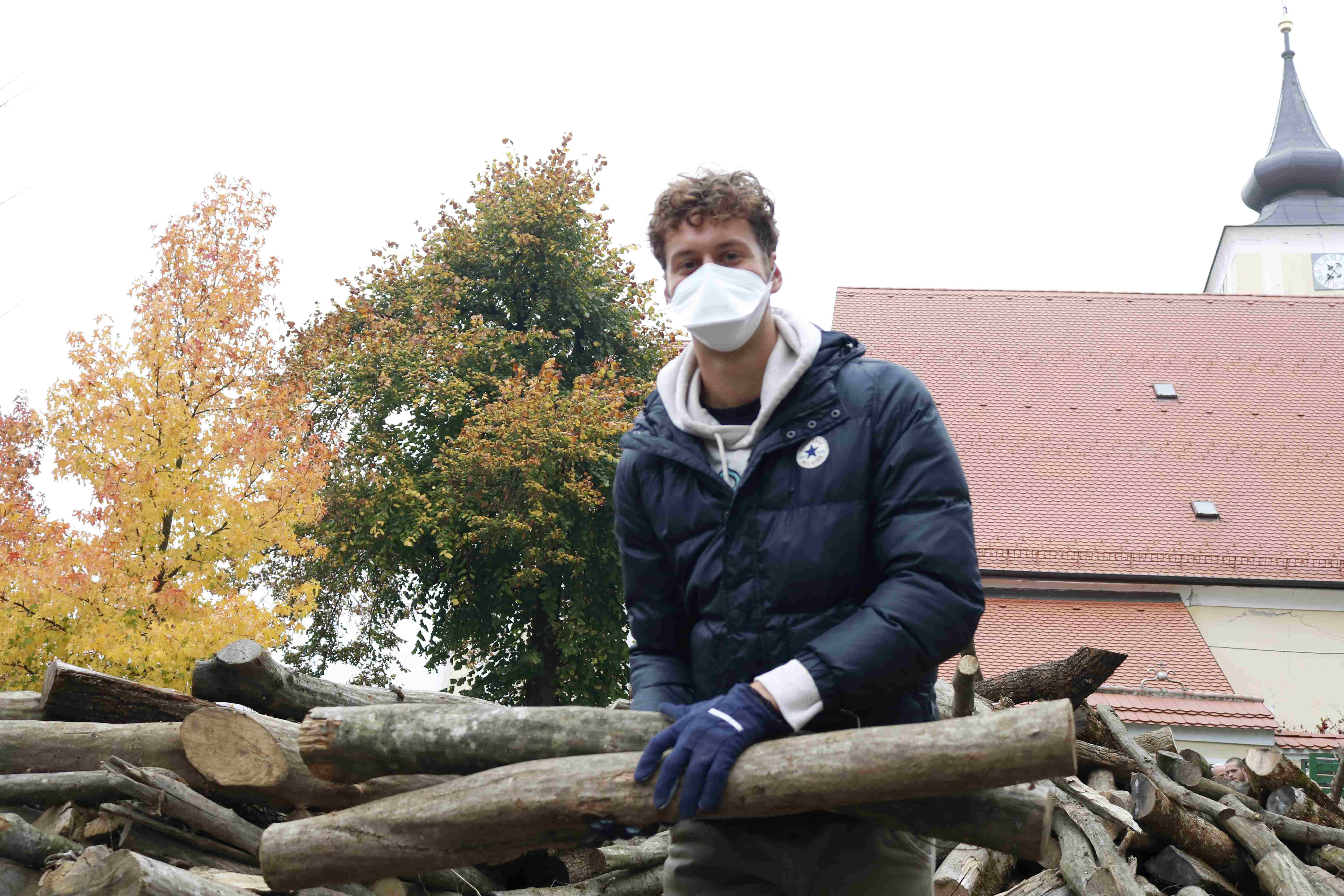 My name is Tomislav Vlajčić and I'm from Zagreb. At the moment, my regular time is spent studying economy and training football. I'm the team leader of a faculty-related group Tourism Lab that's interested in that area of our economy. This is my first time volunteering. I decided to come because it's a good opportunity to help people who are in need and I'm really glad I came. The experience was really worth it and meeting new people, seeing a slightly different culture is priceless. I would recommend it to anyone because it all starts with us.
My name is Tomislav Vlajčić and I'm from Zagreb. At the moment, my regular time is spent studying economy and training football. I'm the team leader of a faculty-related group Tourism Lab that's interested in that area of our economy. This is my first time volunteering. I decided to come because it's a good opportunity to help people who are in need and I'm really glad I came. The experience was really worth it and meeting new people, seeing a slightly different culture is priceless. I would recommend it to anyone because it all starts with us.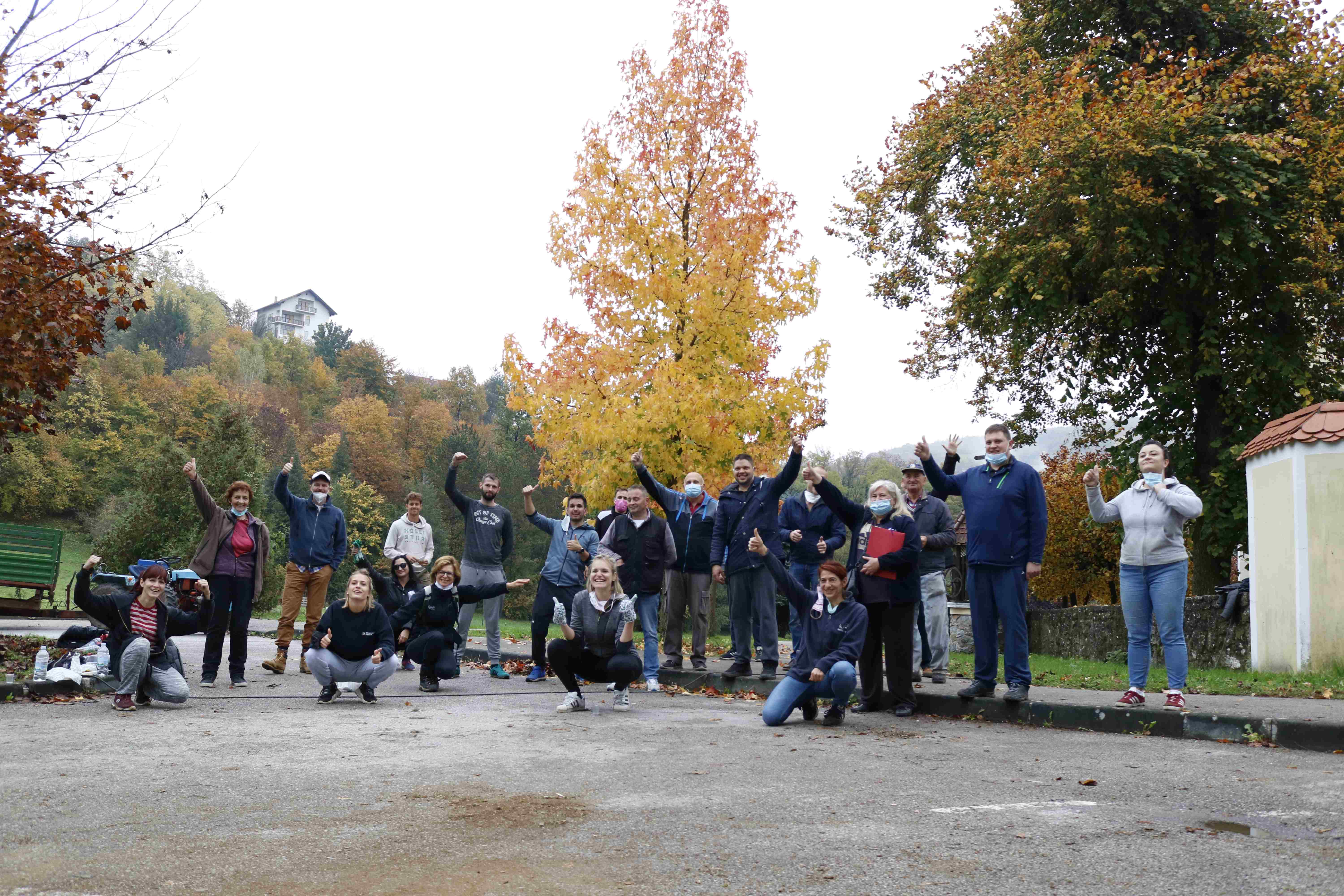
For the latest travel info, bookmark our main travel info article, which is updated daily.
Read the Croatian Travel Update in your language - now available in 24 languages.
When Will Volunteering Become More Appreciated in Croatia?
Want to know how many volunteers we have in Croatia? How many companies allow their employees to do volunteer work as part of their regular work? How many schools have their own volunteer clubs? So many questions, so few answers...
Croatia Volunteers 2017: Apply for 280 Volunteer Activities!
"Croatia Volunteers" will be held from May 22-27, 2017, in 55 Croatian cities.
Do You Want to Volunteer at One of Croatia's Parks this Year?
There are plenty of opportunities to volunteer at one of Croatia’s national or nature parks, here's how!


